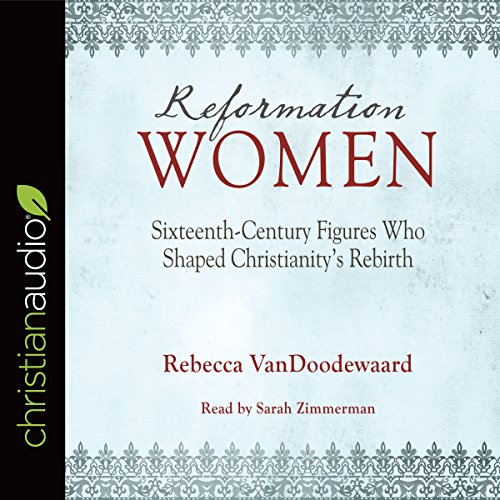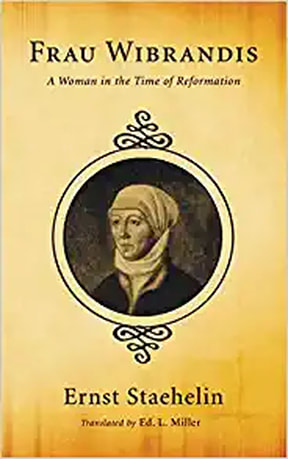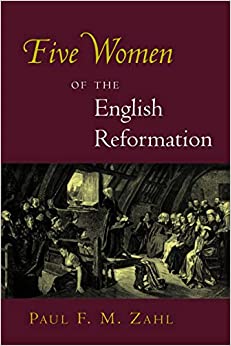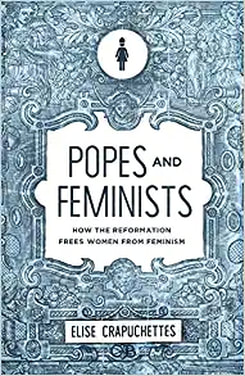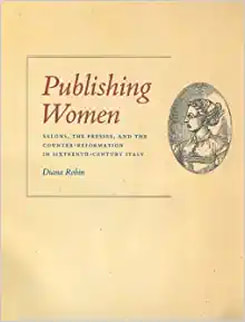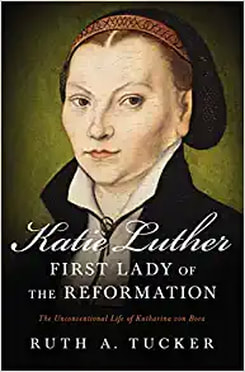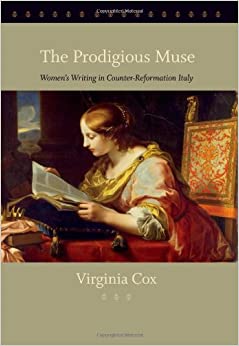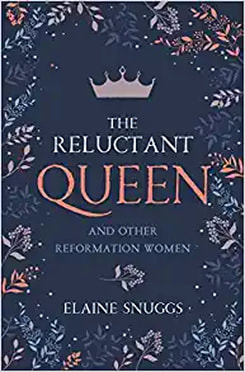19. 1450-1600 Women and the Reformation
|
The Reformation was a time of great change in Europe for both men and women. While men were at the forefront of change, many women also held positions of power and were influential in the changes taking place during this period. While some women were well-respected, respect was difficult to earn and maintain. Women were often persecuted for speaking out. Needless to say, it was not an easy time to be a woman.
|
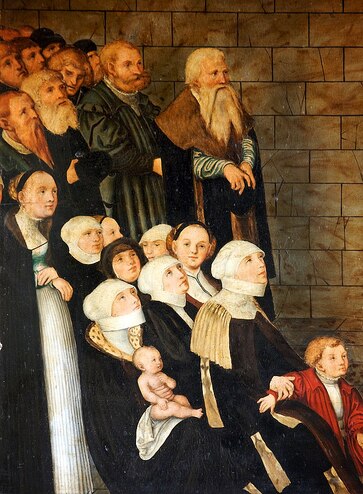 Audience at Martin Luther's Sermon, Wikimedia Commons
Audience at Martin Luther's Sermon, Wikimedia Commons
In 1429, a country girl of no notable background led the French armies toward the end of the One-Hundred Years War. She believed and convinced others that God compelled her to liberate France from the English. Armies rallied behind her. Eventually she was captured and given the option to recant; she did not. IN 1431, she was burned at the stake, not for leading armies against the English, but for treason and for dressing in men’s clothing. Her name was Joan of Arc, and her story symbolizes the way women facilitated great change, only to be beaten back.
Nearly a century later, in 1517,, the Protestant Reformation began in Europe, attempting to reform what they saw as the corrupt Roman Catholic Church. The result was a new branch of Christianity called Protestantism, a name used to describe many religious groups that separated in “protest” from Rome. The movement resulted in wars, persecution of converts, and major shifts in political power.
Martin Luther was a German monk and Professor of Theology at the University of Wittenberg who posted his 95 Theses, complaints against the church, on the door of a church in Germany. Women were deeply affected by this movement. Women were wives of reformers, writers, protectors of the persecuted, and queens active in religious politics. The Reformation was arguably the most significant shift for women’s status because it finally opened doors, however reluctantly to more widespread education for women.
Education
Martin Luther was no champion of women’s rights. He echoed all the misogyny that church leaders had said before him. He wrote, women “are chiefly created to bear children and be the pleasure, joy, and solace of their husbands.” Noting women’s broad hips, he said, “to the end that they should remain at home, sit still, keep house, and bear and bring up children.”
However, Luther’s philosophy was based on the revolutionary idea that the salvation of every human soul relied on their ability to read the Bible. He thus believed in the full education of boys and girls. Luther wrote, “Were there neither soul, heaven, nor hell, it would still be necessary to have schools here below. The world has need of educated men and women, to the end that they may govern the country properly, and that the women may properly bring up their children, care for their domestics, and direct the affairs of their households.”
Luther certainly locked women in the domestic sphere, but he was adamant that their educations were necessary for establishing a new social order for trade, commerce, and urbanization. At least for the west, this trajectory of this change would plateau at times, but women’s access to literacy was here to stay.
Female Reformers
Women were needed to realize the aims of the Reformation. Male reformers like Luther directed their energy to the theology and politics of the Reformation while female reformers worked to establish a ‘Protestant culture’ throughout Europe. This included Bible instruction in homes and charity work. The Protestant churches struggled to balance their need for female support with their inherent distrust of women being too involved in church life. Women were encouraged, but with caution.
During the Reformation, many women left convents after reading the works of Luther and John Calvin, founder of the Calvinist movement. Leaving the security of convent life, these women sought refuge with reformers across the continent. Ursula of Münsterberg was one of them. The granddaughter of a King, her story was well documented and gives us a glimpse into the lives of women–those who left the convent and those who stayed.
More records survive about the royal and noblewomen of the Reformation. Their lives paint a detailed picture of the persecution women faced when they defied male authority to support the Reformation. These were women who used their unique positions of power to support the Reformation, often in isolation. Despite the limitations placed on them by their gender, the role of the Pastor’s wife became a position of prestige in Protestant communities.
Nearly a century later, in 1517,, the Protestant Reformation began in Europe, attempting to reform what they saw as the corrupt Roman Catholic Church. The result was a new branch of Christianity called Protestantism, a name used to describe many religious groups that separated in “protest” from Rome. The movement resulted in wars, persecution of converts, and major shifts in political power.
Martin Luther was a German monk and Professor of Theology at the University of Wittenberg who posted his 95 Theses, complaints against the church, on the door of a church in Germany. Women were deeply affected by this movement. Women were wives of reformers, writers, protectors of the persecuted, and queens active in religious politics. The Reformation was arguably the most significant shift for women’s status because it finally opened doors, however reluctantly to more widespread education for women.
Education
Martin Luther was no champion of women’s rights. He echoed all the misogyny that church leaders had said before him. He wrote, women “are chiefly created to bear children and be the pleasure, joy, and solace of their husbands.” Noting women’s broad hips, he said, “to the end that they should remain at home, sit still, keep house, and bear and bring up children.”
However, Luther’s philosophy was based on the revolutionary idea that the salvation of every human soul relied on their ability to read the Bible. He thus believed in the full education of boys and girls. Luther wrote, “Were there neither soul, heaven, nor hell, it would still be necessary to have schools here below. The world has need of educated men and women, to the end that they may govern the country properly, and that the women may properly bring up their children, care for their domestics, and direct the affairs of their households.”
Luther certainly locked women in the domestic sphere, but he was adamant that their educations were necessary for establishing a new social order for trade, commerce, and urbanization. At least for the west, this trajectory of this change would plateau at times, but women’s access to literacy was here to stay.
Female Reformers
Women were needed to realize the aims of the Reformation. Male reformers like Luther directed their energy to the theology and politics of the Reformation while female reformers worked to establish a ‘Protestant culture’ throughout Europe. This included Bible instruction in homes and charity work. The Protestant churches struggled to balance their need for female support with their inherent distrust of women being too involved in church life. Women were encouraged, but with caution.
During the Reformation, many women left convents after reading the works of Luther and John Calvin, founder of the Calvinist movement. Leaving the security of convent life, these women sought refuge with reformers across the continent. Ursula of Münsterberg was one of them. The granddaughter of a King, her story was well documented and gives us a glimpse into the lives of women–those who left the convent and those who stayed.
More records survive about the royal and noblewomen of the Reformation. Their lives paint a detailed picture of the persecution women faced when they defied male authority to support the Reformation. These were women who used their unique positions of power to support the Reformation, often in isolation. Despite the limitations placed on them by their gender, the role of the Pastor’s wife became a position of prestige in Protestant communities.
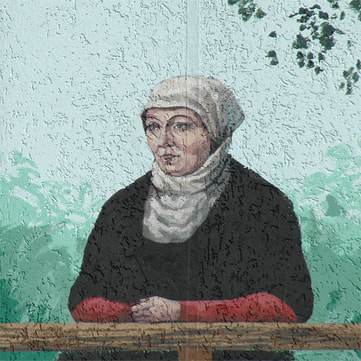 Katharina Zell, Public Domain
Katharina Zell, Public Domain
Katharina Schütz Zell
Women were involved in the Reformation through their marriages and relationships with men in the movement. Katharina Schutz Zell’s education allowed her to take up her pen and record a theological justification of her actions when faced with criticism.
In 1523, Katharina married Matthias Zell, another prominent reformer who had been excommunicated from the Catholic church because of his marriage. A year later, Katharina published her first work, “Apologia,” a defense of clerical marriage in general and hers in particular. Katharina understood the political undercurrents of the time, and she knew her biblical texts and her calling as a clerical wife. For a wife to publish a theological defense of the marriage was a risky move. Had the marriage failed or been shrouded in scandal, this would have provided perfect evidence of the ‘evil’ clerical marriage created. Her work demonstrated that a woman could use her gifts, combine them with theological and biblical knowledge, and create a place for her in the movement.
Strasbourg, Germany, was a ‘free city’ that provided refuge to supporters of Luther who fled from surrounding villages and towns. Whenever refugees arrived, Katharina filled the parsonage with 80 beds and fed 60 every day for 3 weeks. Katharina petitioned the local council to intervene, recruiting others to care for refugees, and writing letters of encouragement to wives left behind when their husbands were forced to flee. In 1525, the male leadership in the church grew tired of her petitions stating, “she is a trifle imperious.”
Despite Zell being twenty years Katharina’s senior, people saw Matthias as being “led by Katharina’s apron strings.” One wrote that, “Matthias lagged because Katherine dragged”. Her marriage of equals, a partnership, was presented as a woman controlling her husband to the detriment of the church.
Luther became a friend of Katharina’s. In the correspondence between them, one would expect to find Luther administering pastoral care and advice to Katharina in accordance with his teaching on gender roles. Instead, we see advice being exchanged between the two equally. Luther wrote to Katharina, not her husband, and asked her to “entreat both your lord and other friends, that (if it please God) peace and union may be preserved.”
Katharina continued her charity work after her husband’s death until the city council insisted she leave her home and allow her husband’s successor to move in. Katharina’s social position was more restricted, so she changed her focus and created a hymn book.
Like most female Reformers, Katharina was criticized by her male colleagues, not so much because of what she did, but because she was a woman. In her lifetime, Katharina witnessed and was victim of a shift in the new Protestant churches and saw herself being pushed out of the sect she helped to establish. She wrote, “In my younger days, I was so dear to the fine old learned men and the architects of the church of Christ.”
Women were involved in the Reformation through their marriages and relationships with men in the movement. Katharina Schutz Zell’s education allowed her to take up her pen and record a theological justification of her actions when faced with criticism.
In 1523, Katharina married Matthias Zell, another prominent reformer who had been excommunicated from the Catholic church because of his marriage. A year later, Katharina published her first work, “Apologia,” a defense of clerical marriage in general and hers in particular. Katharina understood the political undercurrents of the time, and she knew her biblical texts and her calling as a clerical wife. For a wife to publish a theological defense of the marriage was a risky move. Had the marriage failed or been shrouded in scandal, this would have provided perfect evidence of the ‘evil’ clerical marriage created. Her work demonstrated that a woman could use her gifts, combine them with theological and biblical knowledge, and create a place for her in the movement.
Strasbourg, Germany, was a ‘free city’ that provided refuge to supporters of Luther who fled from surrounding villages and towns. Whenever refugees arrived, Katharina filled the parsonage with 80 beds and fed 60 every day for 3 weeks. Katharina petitioned the local council to intervene, recruiting others to care for refugees, and writing letters of encouragement to wives left behind when their husbands were forced to flee. In 1525, the male leadership in the church grew tired of her petitions stating, “she is a trifle imperious.”
Despite Zell being twenty years Katharina’s senior, people saw Matthias as being “led by Katharina’s apron strings.” One wrote that, “Matthias lagged because Katherine dragged”. Her marriage of equals, a partnership, was presented as a woman controlling her husband to the detriment of the church.
Luther became a friend of Katharina’s. In the correspondence between them, one would expect to find Luther administering pastoral care and advice to Katharina in accordance with his teaching on gender roles. Instead, we see advice being exchanged between the two equally. Luther wrote to Katharina, not her husband, and asked her to “entreat both your lord and other friends, that (if it please God) peace and union may be preserved.”
Katharina continued her charity work after her husband’s death until the city council insisted she leave her home and allow her husband’s successor to move in. Katharina’s social position was more restricted, so she changed her focus and created a hymn book.
Like most female Reformers, Katharina was criticized by her male colleagues, not so much because of what she did, but because she was a woman. In her lifetime, Katharina witnessed and was victim of a shift in the new Protestant churches and saw herself being pushed out of the sect she helped to establish. She wrote, “In my younger days, I was so dear to the fine old learned men and the architects of the church of Christ.”
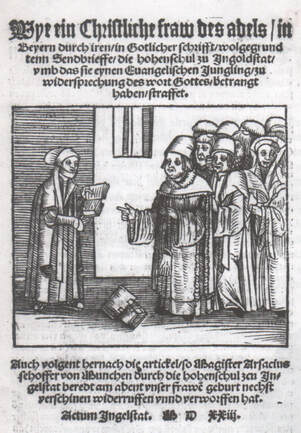 pamphlet of Argula von Grumbach, wikimedia commons
pamphlet of Argula von Grumbach, wikimedia commons
Argula von Grumbach
Argula von Grumbach was a noble woman and avid reader of Protestant literature. When a man at the university in Bavaria where she lived was arrested and facing execution for promoting his Protestant views, Argula wrote to the university, defending him and the teachings of Luther.. She wrote, “I send you not a woman’s ranting, but the Word of God. I write as a member of the Church of Christ against which the gates of hell shall not prevail, as they will against the Church of Rome. God give us grace that we may all be blessed. Amen.”
Argula received no formal reply to her letters. Was this because she was a reformer? Or because she was a woman? The contemporary inscription at the bottom of one of her letters in Munich answers these questions: “Born a Lutheran whore and gate of hell. 13 December, 1523”
A local professor at the university preached against “daughters of Eve” like Arugula before insulting her directly calling her a: “female desperado”, “arrogant devil”, “heretical bitch”, and “shameless whore.”
When her opponents wrote an insulting poem about her, Arugula responded in kind with 240 lines of rhyming couplets which directly referred to her right to speak on religious affairs despite her gender. She wrote, “He tells me to mind my knitting. To obey my man indeed is fitting, but if he drives me from God’s word…Home and child we must forsake, when God’s honor is at stake.”
Arugula continued to plead the Protestant case, both in the public domain and through her writing, for the next seven years. While her letter-writing career spanned only a year, an estimated 29,000 copies of her pamphlets were in circulation in 1524, meaning she was, “the most famous female Lutheran and bestselling pamphleteer.” In later life, living in her inherited estates in Bohemia, she continued her reform efforts, inviting converts to her home and bothering the authorities.
Argula von Grumbach was a noble woman and avid reader of Protestant literature. When a man at the university in Bavaria where she lived was arrested and facing execution for promoting his Protestant views, Argula wrote to the university, defending him and the teachings of Luther.. She wrote, “I send you not a woman’s ranting, but the Word of God. I write as a member of the Church of Christ against which the gates of hell shall not prevail, as they will against the Church of Rome. God give us grace that we may all be blessed. Amen.”
Argula received no formal reply to her letters. Was this because she was a reformer? Or because she was a woman? The contemporary inscription at the bottom of one of her letters in Munich answers these questions: “Born a Lutheran whore and gate of hell. 13 December, 1523”
A local professor at the university preached against “daughters of Eve” like Arugula before insulting her directly calling her a: “female desperado”, “arrogant devil”, “heretical bitch”, and “shameless whore.”
When her opponents wrote an insulting poem about her, Arugula responded in kind with 240 lines of rhyming couplets which directly referred to her right to speak on religious affairs despite her gender. She wrote, “He tells me to mind my knitting. To obey my man indeed is fitting, but if he drives me from God’s word…Home and child we must forsake, when God’s honor is at stake.”
Arugula continued to plead the Protestant case, both in the public domain and through her writing, for the next seven years. While her letter-writing career spanned only a year, an estimated 29,000 copies of her pamphlets were in circulation in 1524, meaning she was, “the most famous female Lutheran and bestselling pamphleteer.” In later life, living in her inherited estates in Bohemia, she continued her reform efforts, inviting converts to her home and bothering the authorities.
Marie Dentière
Marie Dentière, also used her education and position to write. As was common for girls of her social status, Marie entered the convent when she was around 13 years old At the age of 26, Marie was elected Abbess of her Augustinian nunnery but soon fled for her safety.
As the Reformation swept Europe, Marie fled to Strasbourg, and later Geneva, when the victory of Protestant armies declared it a Protestant city. It was then that Marie began her writing career and advocacy for women. She wrote, “If God has given graces to some good women, revealing to them something holy and good through His Holy Scripture, should they, for the sake of the defamers of the truth, refrain from writing down, speaking, or declaring it to each other? Ah! It would be too impudent to hide the talent which God has given to us, we who ought to have the grace to persevere to the end. Amen!”
In Geneva 1,500 copies were printed under a pseudonym, but pastors in Geneva seized the remaining copies and arrested the publisher. The publisher was given a fine, and he and Marie’s husband had to appear before the council and argue that the books were not heretical. The books were never released, and the council quickly passed legislation banning the publication of books which they had not approved. Marie’s husband remarked that this reaction was only because the council had been so, “wounded, piqued and dishonored by a woman.”
The suppression of Marie’s writing generated conversation among Reformers. In 1539, the Council of Bern asked Béat Comte whether they should allow the work to be translated. After reading the book, Comte replied, saying that, while he could find nothing in it contrary to Scripture, because it was written by a woman and should be suppressed. Marie’s voice was silenced, not by Catholic authorities, but by her fellow Reformers.
Marie posed an important question in a letter to Queen Marguerite of Navarre: “Do we have two Gospels, one for men and the other for women?”
Marie Dentière, also used her education and position to write. As was common for girls of her social status, Marie entered the convent when she was around 13 years old At the age of 26, Marie was elected Abbess of her Augustinian nunnery but soon fled for her safety.
As the Reformation swept Europe, Marie fled to Strasbourg, and later Geneva, when the victory of Protestant armies declared it a Protestant city. It was then that Marie began her writing career and advocacy for women. She wrote, “If God has given graces to some good women, revealing to them something holy and good through His Holy Scripture, should they, for the sake of the defamers of the truth, refrain from writing down, speaking, or declaring it to each other? Ah! It would be too impudent to hide the talent which God has given to us, we who ought to have the grace to persevere to the end. Amen!”
In Geneva 1,500 copies were printed under a pseudonym, but pastors in Geneva seized the remaining copies and arrested the publisher. The publisher was given a fine, and he and Marie’s husband had to appear before the council and argue that the books were not heretical. The books were never released, and the council quickly passed legislation banning the publication of books which they had not approved. Marie’s husband remarked that this reaction was only because the council had been so, “wounded, piqued and dishonored by a woman.”
The suppression of Marie’s writing generated conversation among Reformers. In 1539, the Council of Bern asked Béat Comte whether they should allow the work to be translated. After reading the book, Comte replied, saying that, while he could find nothing in it contrary to Scripture, because it was written by a woman and should be suppressed. Marie’s voice was silenced, not by Catholic authorities, but by her fellow Reformers.
Marie posed an important question in a letter to Queen Marguerite of Navarre: “Do we have two Gospels, one for men and the other for women?”
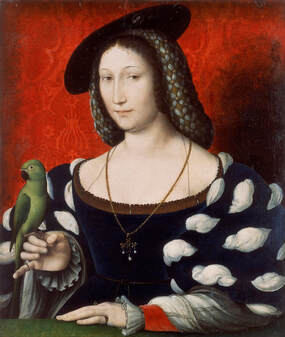 Marguerite of Navarre, Wikimedia Commons
Marguerite of Navarre, Wikimedia Commons
Queens of Navarre
In France, the Protestant Reformation looked more like a civil conflict, and women in the nobility were at the center of it. Marguerite was royalty in France and came to Protestantism gradually. Her brother, Francis, was the King of France who had a deep affection for his sister, which was the only thing protecting her as Marguerite wrote and published extensively.
The situation in France intensified, and by 1525, most of Marguerite’s friends were in exile or hiding. It was then, two years after the death of her first husband, that Marguerite married Henri d’Albert, King of Navarre, with whom she had one daughter, Jeanna d’Albert.
The religious and political situation in France remained tense until 17th October 1534, when a group of zealous reformers took to the streets of Paris, putting up anti-Catholic posters in what was called “The Affair of the Placards.” The signs openly questioned the King’s authority and Francis was forced into action. The ringleaders were arrested and burnt in the Place Maubert, while others fled.
In France, the Protestant Reformation looked more like a civil conflict, and women in the nobility were at the center of it. Marguerite was royalty in France and came to Protestantism gradually. Her brother, Francis, was the King of France who had a deep affection for his sister, which was the only thing protecting her as Marguerite wrote and published extensively.
The situation in France intensified, and by 1525, most of Marguerite’s friends were in exile or hiding. It was then, two years after the death of her first husband, that Marguerite married Henri d’Albert, King of Navarre, with whom she had one daughter, Jeanna d’Albert.
The religious and political situation in France remained tense until 17th October 1534, when a group of zealous reformers took to the streets of Paris, putting up anti-Catholic posters in what was called “The Affair of the Placards.” The signs openly questioned the King’s authority and Francis was forced into action. The ringleaders were arrested and burnt in the Place Maubert, while others fled.
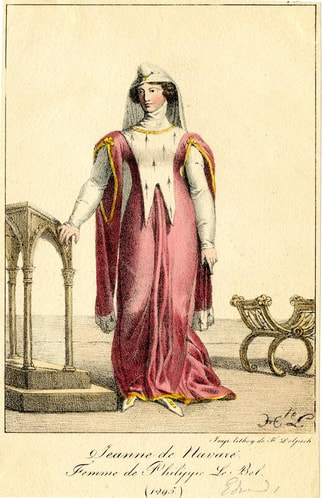 portrait of Jeanne of Navarre, wikimedia commons
portrait of Jeanne of Navarre, wikimedia commons
Risking sibling rivalry, Marguerite opened her home to Protestant refugees. With all of these religious fugitives living in Navarre, Marguerite encouraged religious growth within her domain. Seeing herself as a spiritual mother to her people, Marguerite set about writing manuals on doctrine and worship, the likes never seen in the church before.
But this came at a cost. Calvin, despite benefitting from Marguerite’s dedication to the Reformation, remained critical of her behavior. He continued to argue that she was too generous to the wrong people and not generous enough to the right ones. Calvin summarized her usefulness to the Reformation by stating that: “we cannot place on her too great an alliance.”
When Marguerite and her husband died, their daughter Jeanne ascended to their political post. Jeanne was no stranger to defying the patriarchy, having successfully annulled an undesirable marriage at age twelve by kicking and screaming her way up the aisle, thoroughly documenting her lack of consent to the match and refusing to consummate the marriage. She remarried at age nineteen, presumably for love.
One of her first actions was to convene the Protestant ministers from the Calvinist sect. She became the most powerful female Protestant in Europe and an enemy of the Pope and the rest of her French (and very Catholic) family. In 1562, Catherine de Medici, now Queen regent of France, imposed an edict to try and keep the peace between the Protestant and Catholic factions at court.
Tension mounted between Jeanne and her Catholic husband when she failed to stop the invasion of her husband’s land by a Protestant army of 400 men. Seeing this as a purposeful failure, he put out an order for her arrest with the plan of sending her to a convent. But Jeanne made it to safety. Her husband died in November 1562, leaving her as sole regent of Navarre until her son Henry came of age.
But this came at a cost. Calvin, despite benefitting from Marguerite’s dedication to the Reformation, remained critical of her behavior. He continued to argue that she was too generous to the wrong people and not generous enough to the right ones. Calvin summarized her usefulness to the Reformation by stating that: “we cannot place on her too great an alliance.”
When Marguerite and her husband died, their daughter Jeanne ascended to their political post. Jeanne was no stranger to defying the patriarchy, having successfully annulled an undesirable marriage at age twelve by kicking and screaming her way up the aisle, thoroughly documenting her lack of consent to the match and refusing to consummate the marriage. She remarried at age nineteen, presumably for love.
One of her first actions was to convene the Protestant ministers from the Calvinist sect. She became the most powerful female Protestant in Europe and an enemy of the Pope and the rest of her French (and very Catholic) family. In 1562, Catherine de Medici, now Queen regent of France, imposed an edict to try and keep the peace between the Protestant and Catholic factions at court.
Tension mounted between Jeanne and her Catholic husband when she failed to stop the invasion of her husband’s land by a Protestant army of 400 men. Seeing this as a purposeful failure, he put out an order for her arrest with the plan of sending her to a convent. But Jeanne made it to safety. Her husband died in November 1562, leaving her as sole regent of Navarre until her son Henry came of age.
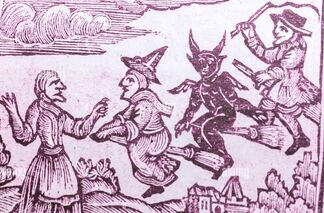 illustration from Malleus Maleficarum, alamy
illustration from Malleus Maleficarum, alamy
With Navarre stuck between Catholic Spain and Catholic France, things were not easy for Jeanne. The Pope threatened to excommunicate and confiscate her lands. Jeanne replied by stating that she did not recognize his authority. Meanwhile, Philip of Spain made plans to either marry her into a Catholic family or kidnap her and allow France and Spain to invade her lands. None of the threats made against her materialized, but, as a young widow and mother with no close alliances, the emotional strain must have been awful In her memoirs, Jeanne remembered how she expected daily to be assassinated.
In 1568, the Spanish Dutch War began. This time, retreat was not an option for Jeanne. She and her son Henry moved to the city of La Rochelle, where they could be better protected. They established a Protestant headquarters. Jeanne sent manifestos to anyone she thought would help. She oversaw the safety of refugees arriving in La Rochelle, setting up a seminary there for them. She assumed control of the city’s fortifications, even going to the battles to assess the damage and rally the forces. Later, she sold her jewelry to finance the fighting.
Jeanne continued to negotiate for peace. In August 1570, when the Catholic forces ran out of money, the Peace of Saint-Germain-en-Laye was achieved. Without hiding her distaste for the French court and her distrust of Catherine de Medici, Jeanne reluctantly agreed to the marriage of her son and King Charles IX’s sister Marguerite. The wedding that inspired violence in the form of the Saint Bartholomew’s Day Massacre.
Jeanne passed away two months before the wedding, in 1572 at the age of 43. The Pope’s envoy to the French court described her passing as, “an event happy beyond my highest hopes…her death, a great work of God’s own hand, has put an end to this wicked woman, who daily perpetrated the greatest possible evil.”
Despite Jeanne’s efforts to secure a Protestant future through her son, Henry later converted to Catholicism to solidify his political situation. His sister, however, ruled on his mother’s lands for thirty years, continuing to provide a relatively safe haven for Protestants.
Witches
People in many societies worldwide, through many eras, have attributed misfortunes like disease, poor harvests, bad weather, or just bad luck, to malicious magic. People of many societies have also, likewise, turned to spells, charms, amulets, and the like, to try to secure advantages for themselves, to tell the future, or to try to ward off harm. Occasionally, a person in the community might actually get blamed for misfortune, as a “witch” or the local culture’s equivalent. This is common.
What is not common is the mass witch hunt; large-scale, sustained efforts to persecute people on charges of malicious magic. In Europe, however, such hunts became a recurring feature of life between about 1400 and 1700 AD. Somewhere between 50,000 and 100,000 people were killed across Europe over these three centuries. About 80-85% of them were women.
In 1568, the Spanish Dutch War began. This time, retreat was not an option for Jeanne. She and her son Henry moved to the city of La Rochelle, where they could be better protected. They established a Protestant headquarters. Jeanne sent manifestos to anyone she thought would help. She oversaw the safety of refugees arriving in La Rochelle, setting up a seminary there for them. She assumed control of the city’s fortifications, even going to the battles to assess the damage and rally the forces. Later, she sold her jewelry to finance the fighting.
Jeanne continued to negotiate for peace. In August 1570, when the Catholic forces ran out of money, the Peace of Saint-Germain-en-Laye was achieved. Without hiding her distaste for the French court and her distrust of Catherine de Medici, Jeanne reluctantly agreed to the marriage of her son and King Charles IX’s sister Marguerite. The wedding that inspired violence in the form of the Saint Bartholomew’s Day Massacre.
Jeanne passed away two months before the wedding, in 1572 at the age of 43. The Pope’s envoy to the French court described her passing as, “an event happy beyond my highest hopes…her death, a great work of God’s own hand, has put an end to this wicked woman, who daily perpetrated the greatest possible evil.”
Despite Jeanne’s efforts to secure a Protestant future through her son, Henry later converted to Catholicism to solidify his political situation. His sister, however, ruled on his mother’s lands for thirty years, continuing to provide a relatively safe haven for Protestants.
Witches
People in many societies worldwide, through many eras, have attributed misfortunes like disease, poor harvests, bad weather, or just bad luck, to malicious magic. People of many societies have also, likewise, turned to spells, charms, amulets, and the like, to try to secure advantages for themselves, to tell the future, or to try to ward off harm. Occasionally, a person in the community might actually get blamed for misfortune, as a “witch” or the local culture’s equivalent. This is common.
What is not common is the mass witch hunt; large-scale, sustained efforts to persecute people on charges of malicious magic. In Europe, however, such hunts became a recurring feature of life between about 1400 and 1700 AD. Somewhere between 50,000 and 100,000 people were killed across Europe over these three centuries. About 80-85% of them were women.
 example of a "witch" being burned at the stake, history extra
example of a "witch" being burned at the stake, history extra
In previous centuries, medieval Christian authorities held that magic was a trick of the Devil, but that the Devil could not control physical reality, because that was God’s role. Magic was therefore a temptation and a delusion but not a mortal threat. Churchmen would preach against it and require penances for it, but they would not execute people for it. In fact, in the 8th century, when he conquered the pagan Saxons, Charlemagne decreed the death penalty for anyone who burned a woman on an accusation of witchcraft, because he saw that as a pagan thing to do. Christians were supposed to know better.
Around 1300 AD, this began to change. Christian authorities in both church and state strove for a more purified, holy society, but the failures of this ideal led to increased paranoia in some. Pessimism, bred by increased famine and plague and destructive wars among kings, added to the anxiety. Maybe God was letting the Devil have more of a role in the world than they thought! Various rumors and fears that had originally been separate, such as anti-Semitic legends and the outrageous accusations against the Knights Templar, wove together into a new myth, the “Witches’ Sabbath.”
According to this myth, “witches” traveled by night to gather at a kind of feast presided over by the Devil. They cursed Christ and swore loyalty to Satan, committed various blasphemies and sexual offenses, killed babies to eat or to boil down into ointments and potions, and promised to wreak as much havoc as they could in Christian society, spreading disease, destroying crops, and so on. Witches were thus imagined to form a kind of dangerous anti-Christian cult or conspiracy.
Witches could be either male or female (gendering the word “witch” feminine and contrasting it to other words like “warlock” or “sorcerer” is a modern usage, not used at the time). As the trials arose, however, women were far more likely to be accused and executed, usually by burning but sometimes by other means (in England, for instance, execution was usually by hanging). Scholars have debated exactly why this was the case. Some have interpreted the trials as “femicide,” an overt misogynistic project to destroy women. However, this interpretation is unlikely; many accusers were themselves women, some witch trials actually targeted more men than women (such as in Normandy and Russia), and while some of the demonology treatises that theorized witchcraft singled out women as especially sinister, others did not. It's also hard to say why this particular era would have initiated a "femicide" when past centuries had been no less misogynistic. Anecdotes from the time suggest stereotypes of witches as marginal, difficult, or assertive women, but actual trial records don't provide solid support that these stereotypes were really driving accusations.
One text that did single out women was the Malleus Maleficarum, or “Hammer of Witches,” published in 1486. In it, drawing on the ancient philosopher Aristotle’s ideas and giving them a Christian slant, Heinrich Kramer argued that because women were “softer” than men, they were more susceptible to spiritual influences. If those influences were holy, then women could become greater saints than men. But if those influences were demonic, they became horrible witches, worse than any man. However, the theology faculty at the University of Cologne condemned Kramer’s book and later witchcraft treatises rarely repeated the claim.
An alternative explanation to the “femicide” hypothesis would be that in the patriarchal structures of European society, women were less likely to have the social prestige, political influence, education, or material resources, to be able to defend themselves. As a result, they were more likely to find themselves accused, and having been accused, less likely to escape the death penalty.
The distribution of witchcraft trials was not uniform across Europe through this period, but varied in time and place. Interestingly, they actually slowed down between 1520 and 1570, the decades of the Protestant Reformation. This is probably because, in the midst of struggles between Protestants and Catholics, social conflict was more likely to result in people accusing each other of belonging to the other religion, rather than of being witches. Once the Reformation settled into a permanent establishment, witch trials picked up again (among both Catholics and Protestants), and were at their peak between 1570 and 1630, before gradually fading out by the early 1700s. People in these later generations still believed in witchcraft, and feared it. But as modern states formed more centralized legal systems, with stricter standards of evidence and more opportunity for oversight and appeals, judges were less likely to accept accusations that a particular defendant in front of them actually was a witch.
Geographically, about half of all victims of witch hunts were in Germany alone. Other countries had far less. England, for instance, had far fewer trials, especially in proportion to its population, than Scotland. In fact, across this entire period, England only had one true “witch hunt,” with perhaps 300 persons accused, as opposed to scattered trials of individuals (and that one was during England’s Civil War in the 1640s, when central authority had broken down. A man named Matthew Hopkins claimed that Parliament had appointed him “Witch Finder General” - it hadn’t - and traveled around the country spreading accusations before being shut down). Again, it’s probably because kingdoms with strong central governments tended to limit the spread of accusations, as legal procedures were more strictly enforced. Places like Germany and Scotland lacked such strong central courts, so local authorities were on their own to deal with accusations, which could thus spin out of control.
Around 1300 AD, this began to change. Christian authorities in both church and state strove for a more purified, holy society, but the failures of this ideal led to increased paranoia in some. Pessimism, bred by increased famine and plague and destructive wars among kings, added to the anxiety. Maybe God was letting the Devil have more of a role in the world than they thought! Various rumors and fears that had originally been separate, such as anti-Semitic legends and the outrageous accusations against the Knights Templar, wove together into a new myth, the “Witches’ Sabbath.”
According to this myth, “witches” traveled by night to gather at a kind of feast presided over by the Devil. They cursed Christ and swore loyalty to Satan, committed various blasphemies and sexual offenses, killed babies to eat or to boil down into ointments and potions, and promised to wreak as much havoc as they could in Christian society, spreading disease, destroying crops, and so on. Witches were thus imagined to form a kind of dangerous anti-Christian cult or conspiracy.
Witches could be either male or female (gendering the word “witch” feminine and contrasting it to other words like “warlock” or “sorcerer” is a modern usage, not used at the time). As the trials arose, however, women were far more likely to be accused and executed, usually by burning but sometimes by other means (in England, for instance, execution was usually by hanging). Scholars have debated exactly why this was the case. Some have interpreted the trials as “femicide,” an overt misogynistic project to destroy women. However, this interpretation is unlikely; many accusers were themselves women, some witch trials actually targeted more men than women (such as in Normandy and Russia), and while some of the demonology treatises that theorized witchcraft singled out women as especially sinister, others did not. It's also hard to say why this particular era would have initiated a "femicide" when past centuries had been no less misogynistic. Anecdotes from the time suggest stereotypes of witches as marginal, difficult, or assertive women, but actual trial records don't provide solid support that these stereotypes were really driving accusations.
One text that did single out women was the Malleus Maleficarum, or “Hammer of Witches,” published in 1486. In it, drawing on the ancient philosopher Aristotle’s ideas and giving them a Christian slant, Heinrich Kramer argued that because women were “softer” than men, they were more susceptible to spiritual influences. If those influences were holy, then women could become greater saints than men. But if those influences were demonic, they became horrible witches, worse than any man. However, the theology faculty at the University of Cologne condemned Kramer’s book and later witchcraft treatises rarely repeated the claim.
An alternative explanation to the “femicide” hypothesis would be that in the patriarchal structures of European society, women were less likely to have the social prestige, political influence, education, or material resources, to be able to defend themselves. As a result, they were more likely to find themselves accused, and having been accused, less likely to escape the death penalty.
The distribution of witchcraft trials was not uniform across Europe through this period, but varied in time and place. Interestingly, they actually slowed down between 1520 and 1570, the decades of the Protestant Reformation. This is probably because, in the midst of struggles between Protestants and Catholics, social conflict was more likely to result in people accusing each other of belonging to the other religion, rather than of being witches. Once the Reformation settled into a permanent establishment, witch trials picked up again (among both Catholics and Protestants), and were at their peak between 1570 and 1630, before gradually fading out by the early 1700s. People in these later generations still believed in witchcraft, and feared it. But as modern states formed more centralized legal systems, with stricter standards of evidence and more opportunity for oversight and appeals, judges were less likely to accept accusations that a particular defendant in front of them actually was a witch.
Geographically, about half of all victims of witch hunts were in Germany alone. Other countries had far less. England, for instance, had far fewer trials, especially in proportion to its population, than Scotland. In fact, across this entire period, England only had one true “witch hunt,” with perhaps 300 persons accused, as opposed to scattered trials of individuals (and that one was during England’s Civil War in the 1640s, when central authority had broken down. A man named Matthew Hopkins claimed that Parliament had appointed him “Witch Finder General” - it hadn’t - and traveled around the country spreading accusations before being shut down). Again, it’s probably because kingdoms with strong central governments tended to limit the spread of accusations, as legal procedures were more strictly enforced. Places like Germany and Scotland lacked such strong central courts, so local authorities were on their own to deal with accusations, which could thus spin out of control.
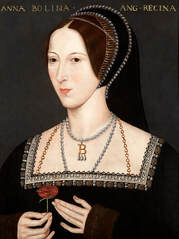 Anne Boleyn, Wikimedia Commons
Anne Boleyn, Wikimedia Commons
Queen Elizabeth I
The Reformation in England presented quite differently than on the continent. The Catholic King Henry VIII had long been married to Catherine of Aragon, daughter of Queen Isabella and King Ferdinand,. They had many pregnancies, but only one daughter, Mary, survived.
Known for his many affairs at court, Henry VIII fell in love with Anne Boleyn, one of his wife's ladies. His passion is evident in letters he wrote– 17 of which survive, "If you... give yourself up, heart, body and soul to me... I will take you for my only mistress, rejecting from thought and affection all others save yourself, to serve only you."
But she boldly said no. "Your wife I cannot be, both in respect of mine own unworthiness, and also because you have a queen already. Your mistress I will not be." Their liaison dragged on, and eventually after over twenty years of marriage, Henry asked the Pope to annul his marriage on the grounds that Catherine had been previously married to his older brother who died just six months after they married. Catherine insisted to her dying day that the marriage to his brother was never consummated and the Pope rejected Henry’s request. In response, Henry broke from Rome. He declared himself the head of the new Church of England; divorced his wife and sent her into isolation. He delegitimize his daughter and heir, and banned Mary from seeing her mother. Henry soon thereafter married his lover, Anne Boleyn.
Although Anne had been raised Catholic, she advocated for reform. She read banned anti-clerical books and supported reformists. Anne's reformist leanings alienated the people of England. The Spanish were furious at the insult to their Princess. An ambassador insulted Anne by calling her "more Lutheran than Luther himself," though this was likely hyperbole. The public hated Anne not just because they viewed her as an adulteress, but because they considered her a heretic.
The Reformation in England presented quite differently than on the continent. The Catholic King Henry VIII had long been married to Catherine of Aragon, daughter of Queen Isabella and King Ferdinand,. They had many pregnancies, but only one daughter, Mary, survived.
Known for his many affairs at court, Henry VIII fell in love with Anne Boleyn, one of his wife's ladies. His passion is evident in letters he wrote– 17 of which survive, "If you... give yourself up, heart, body and soul to me... I will take you for my only mistress, rejecting from thought and affection all others save yourself, to serve only you."
But she boldly said no. "Your wife I cannot be, both in respect of mine own unworthiness, and also because you have a queen already. Your mistress I will not be." Their liaison dragged on, and eventually after over twenty years of marriage, Henry asked the Pope to annul his marriage on the grounds that Catherine had been previously married to his older brother who died just six months after they married. Catherine insisted to her dying day that the marriage to his brother was never consummated and the Pope rejected Henry’s request. In response, Henry broke from Rome. He declared himself the head of the new Church of England; divorced his wife and sent her into isolation. He delegitimize his daughter and heir, and banned Mary from seeing her mother. Henry soon thereafter married his lover, Anne Boleyn.
Although Anne had been raised Catholic, she advocated for reform. She read banned anti-clerical books and supported reformists. Anne's reformist leanings alienated the people of England. The Spanish were furious at the insult to their Princess. An ambassador insulted Anne by calling her "more Lutheran than Luther himself," though this was likely hyperbole. The public hated Anne not just because they viewed her as an adulteress, but because they considered her a heretic.
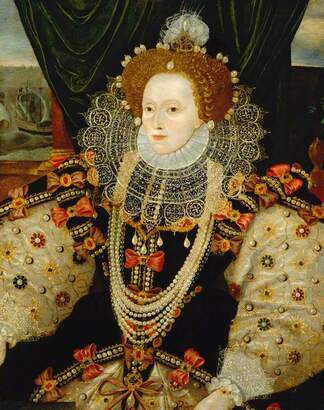 Elizabeth I, Wikimedia Commons
Elizabeth I, Wikimedia Commons
Desperate to secure a male heir, Henry was increasingly frustrated when Anne gave birth to a daughter, Elizabeth. Future pregnancies resulted in miscarriages. He began an affair with Jane Seymour. Anne was furious and Henry was tired of her. He accused her of adultery and incest with her brother. She and her brother were beheaded.
Later, Jane died in childbirth to his only legitimate son. He married again, only for ithe union to end in divorce. His next marriage ended in beheading. When he finally died, leaving his sixth wife alive and well, his weak son ascended to the throne, only to die as a teen. Mary, Henry’s daughter from his first marriage, seized the throne, returning the Catholics to power in what has inaccurately been called a reign of terror earning her the derogatory nickname, Bloody Mary. When Mary died, likely of ovarian cancer, her half sister Elizabeth claimed the throne as Elizabeth I. Elizabeth killed more Catholics than her sister did Protestants, but Elizabeth ruled longer and got to write the history. When she became queen, writers of the period would extol her mother Anne for her Protestant views and credited her with "banishing the beast of Rome with all his beggarly baggage."
Elizabeth’s throne was never secure. Catholics on the continent were constantly looking to usurp the Protestant Queen. Her cousin, Mary Queen of Scots, tried to assassinate her with support fromCatholics in France. But it was Catholic Spain that held the real hatred for Elizabeth, as it was her mother who had replaced their princess, Catherine.
Later, Jane died in childbirth to his only legitimate son. He married again, only for ithe union to end in divorce. His next marriage ended in beheading. When he finally died, leaving his sixth wife alive and well, his weak son ascended to the throne, only to die as a teen. Mary, Henry’s daughter from his first marriage, seized the throne, returning the Catholics to power in what has inaccurately been called a reign of terror earning her the derogatory nickname, Bloody Mary. When Mary died, likely of ovarian cancer, her half sister Elizabeth claimed the throne as Elizabeth I. Elizabeth killed more Catholics than her sister did Protestants, but Elizabeth ruled longer and got to write the history. When she became queen, writers of the period would extol her mother Anne for her Protestant views and credited her with "banishing the beast of Rome with all his beggarly baggage."
Elizabeth’s throne was never secure. Catholics on the continent were constantly looking to usurp the Protestant Queen. Her cousin, Mary Queen of Scots, tried to assassinate her with support fromCatholics in France. But it was Catholic Spain that held the real hatred for Elizabeth, as it was her mother who had replaced their princess, Catherine.
All this came to a head in the late 1580s, when King Philip II of Spain planned the conquest of England. The Pope, Sixtus V, gave his blessing, hoping to secure England as a Catholic kingdom again. At the time, the Spanish had the largest Armada of ships in Europe and had already sailed them across the Atlantic. A giant Spanish invasion fleet was built, but the English attacked early by lighting some of their own ships on fire and sending them afloat into the Spanish fleet. In the confusion, the Spanish sailed right into English guns. Others fled to the open seas where it appeared to the faithful that God himself intervened, as a storm sank the majority of the remaining fleet.
Elizabeth’s defeat of the Spanish Armada was the beginning of the decline of the Spanish Empire and a pivotal victory for Protestantism. This victory for the woman who claimed to have “the heart of a man” was also seen as divine proof of her position as queen.
End of the Reformation
As Protestantism became more established on the continent, the need for female support diminished and tighter restrictions were placed on women’s activities. When it came to women in the ministry and church life, the male reformers found themselves caught between what they thought theologically and what they wanted practically. For male reformers, like their Catholic counterparts, it was theologically unsound and even heretical to have women actively involved in the church. What these men thought about women was in contrast to their need for female support. This confusion was never adequately resolved. Protestant churches established by the Reformation were left with a culture of female involvement coexisting with a theology of female exclusion.
Conclusion
The Protestant Reformation took different shapes in different parts of Europe. In France, it resulted in the persecution of the Huguenots, in Germany wars, in England political drama. Everywhere women were integral to the story.
The result was not only the rise of Protestantism, but the Catholic Counter-Reformation, both largely acknowledged the importance of educating the masses–including women. Women’s access to education, the Bible, and the roles they played in the movement set the stage for the modern era.
By the end of this era, so much remained in question. How much would access to education improve women’s status? How would future women intellectuals be received? And how long would the status sought by reformers take to be realized?
Elizabeth’s defeat of the Spanish Armada was the beginning of the decline of the Spanish Empire and a pivotal victory for Protestantism. This victory for the woman who claimed to have “the heart of a man” was also seen as divine proof of her position as queen.
End of the Reformation
As Protestantism became more established on the continent, the need for female support diminished and tighter restrictions were placed on women’s activities. When it came to women in the ministry and church life, the male reformers found themselves caught between what they thought theologically and what they wanted practically. For male reformers, like their Catholic counterparts, it was theologically unsound and even heretical to have women actively involved in the church. What these men thought about women was in contrast to their need for female support. This confusion was never adequately resolved. Protestant churches established by the Reformation were left with a culture of female involvement coexisting with a theology of female exclusion.
Conclusion
The Protestant Reformation took different shapes in different parts of Europe. In France, it resulted in the persecution of the Huguenots, in Germany wars, in England political drama. Everywhere women were integral to the story.
The result was not only the rise of Protestantism, but the Catholic Counter-Reformation, both largely acknowledged the importance of educating the masses–including women. Women’s access to education, the Bible, and the roles they played in the movement set the stage for the modern era.
By the end of this era, so much remained in question. How much would access to education improve women’s status? How would future women intellectuals be received? And how long would the status sought by reformers take to be realized?
Draw your own conclusions
|
Learn how to teach with inquiry.
Many of these lesson plans were sponsored in part by the Library of Congress Teaching with Primary Sources Eastern Region Program, coordinated by Waynesburg University, the History and Social Studies Education Faculty at Plymouth State University, and the Patrons of the Remedial Herstory Project. |
Lesson Plans from Other Organizations
- This website, Women in World History has primary source based lesson plans on women's history in a whole range of topics. Some are free while others have a cost.
- The Roy Rosenzweig Center for History and New Media has produced recommendations for teaching women's history with primary sources and provided a collection of sources for world history. Check them out!
- The Stanford History Education Group has a number of lesson plans about women in World History.
Joan of Arc: Hear the Words of God and the Maid!
This is a letter to the King of England from Joan of Arc. In the letter, Joan refers to herself as “the maid.”
King of England, render account to the King of Heaven of your royal blood. Return the keys of all the good cities which you have seized, to the Maid. She is sent by God to reclaim the royal blood, and is fully prepared to make peace, if you will give her satisfaction; that is, you must render justice, and pay back all that you have taken.
King of England, if you do not do these things, I am the commander of the military; and in whatever place I shall find your men in France, I will make them flee the country, whether they wish to or not; and if they will not obey, the Maid will have them all killed. She comes sent by the King of Heaven, body for body, to take you out of France, and the Maid promises and certifies to you that if you do not leave France she and her troops will raise a mighty outcry as has not been heard in France in a thousand years. And believe that the King of Heaven has sent her so much power that you will not be able to harm her or her brave army.
To you, archers, noble companions in arms, and all people who are before Orleans, I say to you in God's name, go home to your own country; if you do not do so, beware of the Maid, and of the damages you will suffer. Do not attempt to remain, for you have no rights in France from God, the King of Heaven, and the Son of the Virgin Mary. It is Charles, the rightful heir, to whom God has given France, who will shortly enter Paris in a grand company. If you do not believe the news written of God and the Maid, then in whatever place we may find you, we will soon see who has the better right, God or you.
Duke of Bedford, who call yourself regent of France for the King of England, the Maid asks you not to make her destroy you. If you do not render her satisfaction, she and the French will perform the greatest feat ever done in the name of Christianity.
Translated by Belle Tuten from M. Vallet de Vireville, ed. Chronique de la Pucelle, ou Chronique de Cousinot. Paris: Adolphe Delahaye, 1859, pp. 281-283.
Questions:
King of England, render account to the King of Heaven of your royal blood. Return the keys of all the good cities which you have seized, to the Maid. She is sent by God to reclaim the royal blood, and is fully prepared to make peace, if you will give her satisfaction; that is, you must render justice, and pay back all that you have taken.
King of England, if you do not do these things, I am the commander of the military; and in whatever place I shall find your men in France, I will make them flee the country, whether they wish to or not; and if they will not obey, the Maid will have them all killed. She comes sent by the King of Heaven, body for body, to take you out of France, and the Maid promises and certifies to you that if you do not leave France she and her troops will raise a mighty outcry as has not been heard in France in a thousand years. And believe that the King of Heaven has sent her so much power that you will not be able to harm her or her brave army.
To you, archers, noble companions in arms, and all people who are before Orleans, I say to you in God's name, go home to your own country; if you do not do so, beware of the Maid, and of the damages you will suffer. Do not attempt to remain, for you have no rights in France from God, the King of Heaven, and the Son of the Virgin Mary. It is Charles, the rightful heir, to whom God has given France, who will shortly enter Paris in a grand company. If you do not believe the news written of God and the Maid, then in whatever place we may find you, we will soon see who has the better right, God or you.
Duke of Bedford, who call yourself regent of France for the King of England, the Maid asks you not to make her destroy you. If you do not render her satisfaction, she and the French will perform the greatest feat ever done in the name of Christianity.
Translated by Belle Tuten from M. Vallet de Vireville, ed. Chronique de la Pucelle, ou Chronique de Cousinot. Paris: Adolphe Delahaye, 1859, pp. 281-283.
Questions:
- Based on this source, was. Joan of Arc a heretic?
Catherine de Pizan: The Song of Joan of Arc
A poem by Catherine de Pizan, France's first woman of letters.
And you, Charles, now the king of France, The seventh king of that great name, Who earlier suffered such mischance; You thought the future held more shame. But by God's grace, now look how Joan Has raised your fame on high, oh see! Your enemies before you bow--
This is a welcome novelty!--
Most quickly worked; one would have thought, That such a deed could not be done,
That all your efforts were for nought,
That France was gone; now it is won. Although you took tremendous harm,
You have your country back in tow,
Won back by wise Joan's mighty arm. Thanks be to God, it happened so!
Translated from the French text in Christine de Pisan, Ditié de Jeanne d'Arc, ed. Angus J. Kennedy and Kenneth Varty (Oxford: Society for the Study of Medieval Languages and Literature, 1977), trans. L. Shopkow.
Questions:
And you, Charles, now the king of France, The seventh king of that great name, Who earlier suffered such mischance; You thought the future held more shame. But by God's grace, now look how Joan Has raised your fame on high, oh see! Your enemies before you bow--
This is a welcome novelty!--
Most quickly worked; one would have thought, That such a deed could not be done,
That all your efforts were for nought,
That France was gone; now it is won. Although you took tremendous harm,
You have your country back in tow,
Won back by wise Joan's mighty arm. Thanks be to God, it happened so!
Translated from the French text in Christine de Pisan, Ditié de Jeanne d'Arc, ed. Angus J. Kennedy and Kenneth Varty (Oxford: Society for the Study of Medieval Languages and Literature, 1977), trans. L. Shopkow.
Questions:
- Was Joan of Arc a heretic?
Clergyman: The First Trial Of Joan Of Arc
“We, the judges, say and decree: that you, Joan, have deeply sinned in pretending untruthfully that your revelations and apparitions are of God; in seducing others; in believing lightly and rashly; in making superstitious divinations; in blaspheming God and the Saints; in prevaricating as to the law, Holy Scripture, and the Canonical sanctions; in despising God in His Sacraments; in fomenting seditions and revolts; in apostatizing; in encouraging the crime of heresy; in erring on numerous points in the Catholic Faith.
But because that, after being many times charitably admonished and long waited for, you have at last, with the help of God, returned into the bosom of the Church, your Holy Mother, with contrite heart, and have openly revoked your errors; because, having solemnly and publicly cast these far from you, you have abjured them by the words of your own mouth, together with the heresy with which you were charged: We declare you set free by these presents, according to the form appointed by Ecclesiastical sanction, from the bonds of excommunications which held you enchained, charging you to return to the Church with a true heart and sincere faith, and to observe what has been already enjoined you and what shall yet be enjoined you by us.
But because you have sinned rashly against God and Holy Church, We condemn you, finally, definitely and for salutary penance, saving Our grace and moderation, to perpetual imprisonment, with the bread of sorrow and the water of affliction, in order that you may bewail your faults, and that you may no more commit [acts] which you shall have to bewail hereafter.”
T. Douglas Murray, Jeanne d'Arc (New York: McClure, Phillips & Co, 1902).
Questions:
But because that, after being many times charitably admonished and long waited for, you have at last, with the help of God, returned into the bosom of the Church, your Holy Mother, with contrite heart, and have openly revoked your errors; because, having solemnly and publicly cast these far from you, you have abjured them by the words of your own mouth, together with the heresy with which you were charged: We declare you set free by these presents, according to the form appointed by Ecclesiastical sanction, from the bonds of excommunications which held you enchained, charging you to return to the Church with a true heart and sincere faith, and to observe what has been already enjoined you and what shall yet be enjoined you by us.
But because you have sinned rashly against God and Holy Church, We condemn you, finally, definitely and for salutary penance, saving Our grace and moderation, to perpetual imprisonment, with the bread of sorrow and the water of affliction, in order that you may bewail your faults, and that you may no more commit [acts] which you shall have to bewail hereafter.”
T. Douglas Murray, Jeanne d'Arc (New York: McClure, Phillips & Co, 1902).
Questions:
- How did the Church of England view Joan of Arc?
- Were they justified in their ruling?
Joan Of Arc: A Letter Written During Her Trial
"For this cause, I, Joan, commonly called the Maid, a miserable sinner, after that I had recognized the snares of error in the which I was held, and [after] that, by the grace of God, I had returned to our Holy Mother Church, in order that it may be seen that, not feigningly but with a good heart and good will, I have returned thereto; I confess that I have most grievously sinned, in pretending untruthfully to have had revelations and apparitions from God... in wearing a dissolute habit, misshapen and immodest and against the propriety of nature, and hair clipped 'en ronde' in the style of a man, against all the modesty of the feminine sex; also, in bearing arms in great presumption; in cruelly desiring the effusion of human blood; in saying that all these things I did by the command of God... I confess also that I have been schismatic and in many ways have erred from the Faith... (Signed thus): Jehanne †."
T. Douglas Murray, Jeanne d'Arc (New York: McClure, Phillips & Co, 1902).
Questions:
T. Douglas Murray, Jeanne d'Arc (New York: McClure, Phillips & Co, 1902).
Questions:
- What is the tone?
- Does Joan of Arc believe she has sinned?
Clergyman: Final Trial Of Joan Of Arc
Afterwards, We, the Bishop and Vicar aforesaid, having regard to all that has gone before, in which it is shown that this woman had never truly abandoned her errors... diabolical obstinacy...
WE DECREE THAT YOU ART A RELAPSED HERETIC... we denounce thee as a rotten member, and that you may not vitiate others, as cast out from the unity of the Church... Here follows the Sentence of Excommunication. . . that you have been on the subject of thy pretended divine revelations and apparitions lying, seducing, and blasphemy towards God and the Saints... WE DECLARE THEE OF RIGHT EXCOMMUNICATE AND HERETIC... We do abandon thee to the secular authority, as a member of Satan.
T. Douglas Murray, Jeanne d'Arc (New York: McClure, Phillips & Co, 1902.
Questions:
WE DECREE THAT YOU ART A RELAPSED HERETIC... we denounce thee as a rotten member, and that you may not vitiate others, as cast out from the unity of the Church... Here follows the Sentence of Excommunication. . . that you have been on the subject of thy pretended divine revelations and apparitions lying, seducing, and blasphemy towards God and the Saints... WE DECLARE THEE OF RIGHT EXCOMMUNICATE AND HERETIC... We do abandon thee to the secular authority, as a member of Satan.
T. Douglas Murray, Jeanne d'Arc (New York: McClure, Phillips & Co, 1902.
Questions:
- Was Joan of Arc decreed a heretic?
Brother Seguin de Seguin: Testimony From the Rehabilitation Trials
Church officials worried that the original charges of heresy were politically, not religiously motivated. With the support of Joan’s surviving family, Bishops were open to revisit the original trials. The transcripts of the original hearing at Poitiers had been lost so clergy who had been present came to testify.
From the testimony of Brother Seguin de Seguin, Professor of Theology at Poitiers:
"Do you believe in God ?" I asked her. " In truth, more than yourself!" she answered. "But God wills that you should not be believed unless there appear some sign to prove that you ought to be believed; and we shall not advise the King to trust in you, and to risk an army on your simple statement." "In God's Name! " she replied, "I am not come to Poitiers to show signs: but send me to Orleans, where I shall show you the signs by which I am sent: and she added: "Send me men in such numbers as may seem good, and I will go to Orleans."
And then she foretold to us - to me and to all the others who were with me - these four things which should happen, and which did afterwards come to pass: first, that the English would be destroyed, the siege of Orleans raised, and the town delivered from the English; secondly, that the King would be crowned at Reims; thirdly, that Paris would be restored to his dominion; and fourthly, that the Duke d'Orleans should be brought back from England. And I who speak, I have in truth seen these four things accomplished.
We reported all this to the Council of the King; and we were of opinion that, considering the extreme necessity and the great peril of the town, the King might make use of her help and send her to Orleans. Besides this, we inquired into her life and morals; and found that she was a good Christian, living as a Catholic, never idle. In order that her manner of living might be better known, women were placed with her who were commissioned to report to the Council her actions and ways.
“Trial at Poiters.” Saint Joan of Arc's Trials. Accessed November 4, 2022. http://www.stjoan- center.com/Trials/index.html#nullification.
Questions:
From the testimony of Brother Seguin de Seguin, Professor of Theology at Poitiers:
"Do you believe in God ?" I asked her. " In truth, more than yourself!" she answered. "But God wills that you should not be believed unless there appear some sign to prove that you ought to be believed; and we shall not advise the King to trust in you, and to risk an army on your simple statement." "In God's Name! " she replied, "I am not come to Poitiers to show signs: but send me to Orleans, where I shall show you the signs by which I am sent: and she added: "Send me men in such numbers as may seem good, and I will go to Orleans."
And then she foretold to us - to me and to all the others who were with me - these four things which should happen, and which did afterwards come to pass: first, that the English would be destroyed, the siege of Orleans raised, and the town delivered from the English; secondly, that the King would be crowned at Reims; thirdly, that Paris would be restored to his dominion; and fourthly, that the Duke d'Orleans should be brought back from England. And I who speak, I have in truth seen these four things accomplished.
We reported all this to the Council of the King; and we were of opinion that, considering the extreme necessity and the great peril of the town, the King might make use of her help and send her to Orleans. Besides this, we inquired into her life and morals; and found that she was a good Christian, living as a Catholic, never idle. In order that her manner of living might be better known, women were placed with her who were commissioned to report to the Council her actions and ways.
“Trial at Poiters.” Saint Joan of Arc's Trials. Accessed November 4, 2022. http://www.stjoan- center.com/Trials/index.html#nullification.
Questions:
- Was Joan of Arc a heretic?
Martin Luther: Table Talk
These are conversations Luther had had with students, colleagues, and friends.
CXCV .
The history of the resurrection of Christ, teaching that which human wit and wisdom of itself cannot believe, that “Christ is risen from the dead,” was declared to the weaker and sillier creatures, women, and such as were perplexed and troubled. Silly, indeed, before God, and before the world: first, before God, in that they “sought the living among the dead;” second, before the world, for they forgot the “great stone which lay at the mouth of the sepulchre,” and prepared spices to anoint Christ, which was all in vain. But spiritually is hereby signified this: if the “great stone,” namely, the law and human traditions, whereby the consciences are bound and snared, be not rolled away from the heart, then we cannot find Christ, or believe that he is risen from the dead. For through him we are delivered from the power of sin and death, Rom. viii., so that the hand-writing of the conscience can hurt us no more.
CCCXCIX.
Luther’s wife said to him: Sir, I heard your cousin, John Palmer, preach this afternoon in the parish church, whom I understood better than Dr. Palmer, though the Doctor is held to be a very excellent preacher. Luther answered: John Palmer preaches as ye women use to talk; for what comes into your minds, ye speak. A preacher ought to remain by the text, and deliver that which he has before him, to the end people may well understand it. But a preacher that will speak every thing that comes in his mind, is like a maid that goes to market, and meeting another maid, makes a stand, and they hold together a goods-market.
“Table Talk with Luther.” Work info: Table Talk - Christian Classics Ethereal Library. Accessed November 8, 2022. https://www.ccel.org/ccel/luther/tabletalk.
Questions:
CXCV .
The history of the resurrection of Christ, teaching that which human wit and wisdom of itself cannot believe, that “Christ is risen from the dead,” was declared to the weaker and sillier creatures, women, and such as were perplexed and troubled. Silly, indeed, before God, and before the world: first, before God, in that they “sought the living among the dead;” second, before the world, for they forgot the “great stone which lay at the mouth of the sepulchre,” and prepared spices to anoint Christ, which was all in vain. But spiritually is hereby signified this: if the “great stone,” namely, the law and human traditions, whereby the consciences are bound and snared, be not rolled away from the heart, then we cannot find Christ, or believe that he is risen from the dead. For through him we are delivered from the power of sin and death, Rom. viii., so that the hand-writing of the conscience can hurt us no more.
CCCXCIX.
Luther’s wife said to him: Sir, I heard your cousin, John Palmer, preach this afternoon in the parish church, whom I understood better than Dr. Palmer, though the Doctor is held to be a very excellent preacher. Luther answered: John Palmer preaches as ye women use to talk; for what comes into your minds, ye speak. A preacher ought to remain by the text, and deliver that which he has before him, to the end people may well understand it. But a preacher that will speak every thing that comes in his mind, is like a maid that goes to market, and meeting another maid, makes a stand, and they hold together a goods-market.
“Table Talk with Luther.” Work info: Table Talk - Christian Classics Ethereal Library. Accessed November 8, 2022. https://www.ccel.org/ccel/luther/tabletalk.
Questions:
- How does Luther describe women in CXCV? Is that what he believes or what he thinks the church believes?
- How does Luther describe women in CCCXCIX?
Martin Luther: Table Talk II
This is a pair of conversations between Luther and another, most likely a colleague or peer.
CCCCLXXXVIII.
The state of celibacy is great hypocrisy and wickedness. Augustine, though he lived in a good and acceptable time, was deceived through the exaltation of nuns. And although he gave them leave to marry, yet he said they did wrong to marry, and sinned against God. Afterwards, when the time of wrath and blindness came, and the truth was hunted away, and lying got the upper hand, the generation of poor women was condemned, under the color of great holiness, but which, in truth, was mere hypocrisy. Christ with one sentence confutes all their arguments: God created them male and female.
“Table Talk with Luther.” Work info: Table Talk - Christian Classics Ethereal Library. Accessed November 8, 2022. https://www.ccel.org/ccel/luther/tabletalk.
Questions:
CCCCLXXXVIII.
The state of celibacy is great hypocrisy and wickedness. Augustine, though he lived in a good and acceptable time, was deceived through the exaltation of nuns. And although he gave them leave to marry, yet he said they did wrong to marry, and sinned against God. Afterwards, when the time of wrath and blindness came, and the truth was hunted away, and lying got the upper hand, the generation of poor women was condemned, under the color of great holiness, but which, in truth, was mere hypocrisy. Christ with one sentence confutes all their arguments: God created them male and female.
“Table Talk with Luther.” Work info: Table Talk - Christian Classics Ethereal Library. Accessed November 8, 2022. https://www.ccel.org/ccel/luther/tabletalk.
Questions:
- How does Luther view celibacy?
- Was Luther supportive of nuns?
- Was Martin Luther a sexist?
Jeanne De Jussie: Excerpts From The Short Chronicle
Jeanne De Jussie was a nun living in Geneva at the time of the Reformation. She kept a journal detailing her and her sister's experience as nuns facing persecution from Protestant Reformers.
"For in no way do we wish for any innovation of faith or law, or to abandon the divine office, but are determined to live and die in our holy vocation here in your convent praying to our Lord for the peace and preservation of your noble city"
“The poor sisters all as one took refuge in the church, their heads bowed down to the ground, and they prayed to God with a great many tears and in anguish"
“[One of the captain's soldiers who broke into the covenant] washed his hands in the holy water and spit in it. And when they were outside and people asked him how the ladies were and what they had done, this bad guard boasted that he had uncovered one's face and kissed her. Which was a false lie, because he never touched a nun in there, and no one did them any harm that day .”
[After the nuns covenant was broken into two [Reformer] women approached them] “"Now take comfort in our Lord," they said, "and tell us privately if anyone touched you”. The secular women understood immediately what was at stake for the nuns in this violation of their cloister. "No," the prioress replied, "I believe that our Lord did not let them". The nuns had been spiritually, but not physically, violated. Greatly relieved, the women told the nuns they would need to be brave and to trust in the Lord, that the battle was just beginning.
"They are stronger than we are, and I think they intend to come find you". Men from both sides of the Reformation, Jussie suggested, saw this time of religious and social upheaval as an opportunity to take advantage of the cloistered virgins.
Jussie wrote, "the wicked preacher Guillaume Farel and Pierre Viret of Orbe took up residence in the convent of St. Francis in the room of Reverend Father the suffragan" (172). Farel, she noted, reproached the nuns from the pulpit: And because he was near the convent of the poor sisters of St. Clare, he caused them great distress with his followers, commending [the nuns] to his listeners from the pulpit, saying they were poor blind women who had strayed in their faith, and that for their salvation they should be set free from prison, and that everyone should throw rocks at them”
Klaus, Carrie F. “Architecture and Sexual Identity: Jeanne de Jussie’s Narrative of the Reformation of Geneva.” Feminist Studies 29, no. 2 (2003): 279–97. http://www.jstor.org/stable/3178510.
Questions:
"For in no way do we wish for any innovation of faith or law, or to abandon the divine office, but are determined to live and die in our holy vocation here in your convent praying to our Lord for the peace and preservation of your noble city"
“The poor sisters all as one took refuge in the church, their heads bowed down to the ground, and they prayed to God with a great many tears and in anguish"
“[One of the captain's soldiers who broke into the covenant] washed his hands in the holy water and spit in it. And when they were outside and people asked him how the ladies were and what they had done, this bad guard boasted that he had uncovered one's face and kissed her. Which was a false lie, because he never touched a nun in there, and no one did them any harm that day .”
[After the nuns covenant was broken into two [Reformer] women approached them] “"Now take comfort in our Lord," they said, "and tell us privately if anyone touched you”. The secular women understood immediately what was at stake for the nuns in this violation of their cloister. "No," the prioress replied, "I believe that our Lord did not let them". The nuns had been spiritually, but not physically, violated. Greatly relieved, the women told the nuns they would need to be brave and to trust in the Lord, that the battle was just beginning.
"They are stronger than we are, and I think they intend to come find you". Men from both sides of the Reformation, Jussie suggested, saw this time of religious and social upheaval as an opportunity to take advantage of the cloistered virgins.
Jussie wrote, "the wicked preacher Guillaume Farel and Pierre Viret of Orbe took up residence in the convent of St. Francis in the room of Reverend Father the suffragan" (172). Farel, she noted, reproached the nuns from the pulpit: And because he was near the convent of the poor sisters of St. Clare, he caused them great distress with his followers, commending [the nuns] to his listeners from the pulpit, saying they were poor blind women who had strayed in their faith, and that for their salvation they should be set free from prison, and that everyone should throw rocks at them”
Klaus, Carrie F. “Architecture and Sexual Identity: Jeanne de Jussie’s Narrative of the Reformation of Geneva.” Feminist Studies 29, no. 2 (2003): 279–97. http://www.jstor.org/stable/3178510.
Questions:
- Was Martin Luther a sexist?
- How are the men described? How are the women?
Vicaress And A Reformed Preacher: Conversation
Another conversation recorded between Mother Vicaress, who was the priestess present with Jeanne De Jusse, and a Reformed Preacher.
[the Reformed preacher] said, “And you, Father Confessor, who keep these poor blind women in this damnable captivity, why don’t you make them be quiet and listen to the word of God? But they cannot hear it because they are not from God, but all have corrupt hearts, pretending to live chastely in seclusion and tricking everyone. However, we know well that many of these poor young girls would come willingly to the truth of the Gospel and the great goodness of marriage if you and the old women did not keep them in such restraint and subjection.”
...But mother vicaress, who was outside, did not keep silent but went up to the wall right next to the preacher and hit it hard with her two fists and shouted, “Oh, you wretched and wicked coward, you speak your false words in vain. You will gain nothing here. I beg you, sisters, not to listen to anything he says.” This disturbed them even more than before, and she made such a noise with her hands and her loud shouting that he forgot what he was saying. The syndics swore they would put her in prison. But she was steadfast in her strong will and not afraid to die for the honor of God. Some of the sisters had stuffed their ears with wax so they would not hear him. When he saw that they were not paying any attention to him, the preacher stopped, and from the look of him, he wished he had never come inside and thought he could not get out soon enough.
Welborn, Amy, CNA Daily News, Anthony E. Clark, Catholic News Agency, and Carl E. Olson. “Women and the Protestant Reformation.” Catholic World Report, October 28, 2017. https://www.catholicworldreport.com/2017/10/28/women-and-the-protestant-reformation/.
Questions:
[the Reformed preacher] said, “And you, Father Confessor, who keep these poor blind women in this damnable captivity, why don’t you make them be quiet and listen to the word of God? But they cannot hear it because they are not from God, but all have corrupt hearts, pretending to live chastely in seclusion and tricking everyone. However, we know well that many of these poor young girls would come willingly to the truth of the Gospel and the great goodness of marriage if you and the old women did not keep them in such restraint and subjection.”
...But mother vicaress, who was outside, did not keep silent but went up to the wall right next to the preacher and hit it hard with her two fists and shouted, “Oh, you wretched and wicked coward, you speak your false words in vain. You will gain nothing here. I beg you, sisters, not to listen to anything he says.” This disturbed them even more than before, and she made such a noise with her hands and her loud shouting that he forgot what he was saying. The syndics swore they would put her in prison. But she was steadfast in her strong will and not afraid to die for the honor of God. Some of the sisters had stuffed their ears with wax so they would not hear him. When he saw that they were not paying any attention to him, the preacher stopped, and from the look of him, he wished he had never come inside and thought he could not get out soon enough.
Welborn, Amy, CNA Daily News, Anthony E. Clark, Catholic News Agency, and Carl E. Olson. “Women and the Protestant Reformation.” Catholic World Report, October 28, 2017. https://www.catholicworldreport.com/2017/10/28/women-and-the-protestant-reformation/.
Questions:
- How were nuns treated during the Protestant Reformation?
Unknown: Women And The Protestant Reformation
Reformer women were also subjected to scrutiny.
“On the Feast of Corpus Christi [June 4] the Christians courageously held the usual procession through the city. Several Lutheran woman wearing velvet hoods sat at their windows so that everyone could see them working with distaffs and needles. They did the same thing on all the feast days, more than on other days, in plain view from the streets, which caused the Christians much turmoil. It was said that on the days after Easter and Pentecost many of them washed and did their laundry. Some good people went and threw their laundry into the Rhone, and the women did not have an easy time of it, because they had to work hard to get it back and to keep from losing it. When the procession was passing by, someone pulled the distaff from a fat Lutheran woman’s side and hit her on the head with it and threw her work into the mud and trampled it. Then that person went back into the procession before she knew what had happened.”
Welborn, Amy, CNA Daily News, Anthony E. Clark, Catholic News Agency, and Carl E. Olson. “Women and the Protestant Reformation.” Catholic World Report, October 28, 2017. https://www.catholicworldreport.com/2017/10/28/women-and-the-protestant-reformation/.
Questions:
“On the Feast of Corpus Christi [June 4] the Christians courageously held the usual procession through the city. Several Lutheran woman wearing velvet hoods sat at their windows so that everyone could see them working with distaffs and needles. They did the same thing on all the feast days, more than on other days, in plain view from the streets, which caused the Christians much turmoil. It was said that on the days after Easter and Pentecost many of them washed and did their laundry. Some good people went and threw their laundry into the Rhone, and the women did not have an easy time of it, because they had to work hard to get it back and to keep from losing it. When the procession was passing by, someone pulled the distaff from a fat Lutheran woman’s side and hit her on the head with it and threw her work into the mud and trampled it. Then that person went back into the procession before she knew what had happened.”
Welborn, Amy, CNA Daily News, Anthony E. Clark, Catholic News Agency, and Carl E. Olson. “Women and the Protestant Reformation.” Catholic World Report, October 28, 2017. https://www.catholicworldreport.com/2017/10/28/women-and-the-protestant-reformation/.
Questions:
- What is this source describing?
Argula von Grumbach: Letter of Protest to the University of Ingolstadt
Letter written by female Reformer Argula von Grumbach protesting against the arrest of Arsacius Seehofer for teaching Lutheran ideas. the faculty of Ingolstadt ignored von Grumbach's letter, and Seehofer remained imprisoned. She then had the letter published and, as Protestant works were popular reading at this time (because they challenged traditional authority), it became a bestseller. Perhaps, if they had not dismissed her as just a woman who had no business telling them what to do, the faculty would not have had to face the public embarrassment of a woman, who had never attended university, showing she knew scripture as well as they.
How in God's name can you and your university expect to prevail, when you deploy such foolish violence against the word of God; when you force someone to hold the holy Gospel in their hands for the very purpose of denying it, as you did in the case of Arsacius Seehofer? When you confront him with an oath and declaration such as this, and use imprisonment and even the threat of the stake to force him to deny Christ and his word?
Yes, when I reflect on this, my heart and all my limbs tremble. What do Luther or Melanchthon teach you but the word of God? You condemn them without having refuted them. Did Christ teach you so, or his apostles, prophets, or evangelists? Show me where this is written! You lofty experts, nowhere in the Bible do I find that Christ, or his apostles, or his prophets put people in prison, burnt or murdered them, or sent them into exile...Don't you know what the Lords says in Matthew 10? "Have no fear of him who can take your body but then his power is at an end. But fear him who has power to dispatch soul and body into the depths of hell."
... Have no doubt about this: God looks mercifully on Arsacius, or will do so in the future, just as he did on Peter, who denied the Lord three times. For each day the just person falls seven times and gets up on his feet again. God does not want the death of the sinner, but his conversion and life. Christ the Lord himself feared death; so much so that he sweated a bloody sweat. I trust that God will yet see much good from this young man. Just as Peter, too, did much good work later, after his denial of the Lord. And, unlike this man, he was still free, and did not suffer such lengthy imprisonment, or the threat of the stake...
Are you not ashamed that Seehofer had to deny all the writings of Martin, who put the New Testament into German, simply following the text? That means that the holy Gospel and the Epistles and the story of the Apostles and so on are all dismissed by you as heresy. It seems there is no hope of a proper discussion with you. And then there's the five books of Moses, which are being printed too. Is that nothing? I hear nothing about any of you refuting a single article of Arsacius from Scripture...
I beseech you for the sake of God, and exhort you by God's judgement and righteousness, to tell me in writing which of the articles written by Martin or Melanchthon you consider heretical. In German, not a single one seems heretical to me. And the fact is that a great deal has been published in German, and I've read it all. Spalatin sent me a list of all the titles. I have always wanted to find out the truth...My dear lord and father insisted on me reading [the Bible] when I was ten years old. Unfortunately, I did not obey him, being seduced by the afore-named clerics, especially the Observants who said that I would be led astray.
... I do not flinch from appearing before you, from listening to you, from discussing with you. For by the grace of God I, too, can ask questions, hear answers, and read in German. There are, of course, German Bibles which Martin has not translated. You yourselves have on which was printed forty-one years ago, when Luther’s was never even thought of.
If God had not ordained it, I might behave like the others, and write or say that he perverts Scripture; that is contrary to God's will. Although I have yet to read anyone who is his equal in translating it into German. May God, who works all this in him, be his reward here in time and in eternity. And even if it came to pass – which God forfend – that Luther were to revoke his views, that would not worry me. I do not build on his, mine, or any person's understanding, but on the true rock, Christ himself, which the builders have rejected. But he has been made the foundation stone and the head of the corner, as Paul says in I Corinthians 3: "No other base can be laid, than that which is laid, which is Christ..."
I have no Latin; but you have German, being born and brought up in this tongue. What I have written you is no woman's chit-chat, but the word of God; and I wrote as a member of the Christian Church, against which the gates of Hell cannot prevail. Against the Roman, however, they do prevail. Just look at that church! How is it to prevail against the gates of Hell? God give us his grace, that we all may be saved, and may God rule us according to His will. Now may his grace carry the day. Amen.
Dietfurt. Sunday after the exaltation of the holy Cross. The year of the Lord One thousand five hundred and in the twenty-third year.
My signature, Argula von Grumbach, von Stauff by birth.
To the reverent, honorable, well-born, most learned, noble and esteemed Rector and general council of the whole University of Ingolstadt.
Jordon, S.E. Additional Primary Readings for A Reformation Reader. Fortress Press, 2002. Retrieved from https://www.worldhistory.org/article/1971/argula-von-grumbachs-to-the-university-of-ingolsta/.
Questions:
How in God's name can you and your university expect to prevail, when you deploy such foolish violence against the word of God; when you force someone to hold the holy Gospel in their hands for the very purpose of denying it, as you did in the case of Arsacius Seehofer? When you confront him with an oath and declaration such as this, and use imprisonment and even the threat of the stake to force him to deny Christ and his word?
Yes, when I reflect on this, my heart and all my limbs tremble. What do Luther or Melanchthon teach you but the word of God? You condemn them without having refuted them. Did Christ teach you so, or his apostles, prophets, or evangelists? Show me where this is written! You lofty experts, nowhere in the Bible do I find that Christ, or his apostles, or his prophets put people in prison, burnt or murdered them, or sent them into exile...Don't you know what the Lords says in Matthew 10? "Have no fear of him who can take your body but then his power is at an end. But fear him who has power to dispatch soul and body into the depths of hell."
... Have no doubt about this: God looks mercifully on Arsacius, or will do so in the future, just as he did on Peter, who denied the Lord three times. For each day the just person falls seven times and gets up on his feet again. God does not want the death of the sinner, but his conversion and life. Christ the Lord himself feared death; so much so that he sweated a bloody sweat. I trust that God will yet see much good from this young man. Just as Peter, too, did much good work later, after his denial of the Lord. And, unlike this man, he was still free, and did not suffer such lengthy imprisonment, or the threat of the stake...
Are you not ashamed that Seehofer had to deny all the writings of Martin, who put the New Testament into German, simply following the text? That means that the holy Gospel and the Epistles and the story of the Apostles and so on are all dismissed by you as heresy. It seems there is no hope of a proper discussion with you. And then there's the five books of Moses, which are being printed too. Is that nothing? I hear nothing about any of you refuting a single article of Arsacius from Scripture...
I beseech you for the sake of God, and exhort you by God's judgement and righteousness, to tell me in writing which of the articles written by Martin or Melanchthon you consider heretical. In German, not a single one seems heretical to me. And the fact is that a great deal has been published in German, and I've read it all. Spalatin sent me a list of all the titles. I have always wanted to find out the truth...My dear lord and father insisted on me reading [the Bible] when I was ten years old. Unfortunately, I did not obey him, being seduced by the afore-named clerics, especially the Observants who said that I would be led astray.
... I do not flinch from appearing before you, from listening to you, from discussing with you. For by the grace of God I, too, can ask questions, hear answers, and read in German. There are, of course, German Bibles which Martin has not translated. You yourselves have on which was printed forty-one years ago, when Luther’s was never even thought of.
If God had not ordained it, I might behave like the others, and write or say that he perverts Scripture; that is contrary to God's will. Although I have yet to read anyone who is his equal in translating it into German. May God, who works all this in him, be his reward here in time and in eternity. And even if it came to pass – which God forfend – that Luther were to revoke his views, that would not worry me. I do not build on his, mine, or any person's understanding, but on the true rock, Christ himself, which the builders have rejected. But he has been made the foundation stone and the head of the corner, as Paul says in I Corinthians 3: "No other base can be laid, than that which is laid, which is Christ..."
I have no Latin; but you have German, being born and brought up in this tongue. What I have written you is no woman's chit-chat, but the word of God; and I wrote as a member of the Christian Church, against which the gates of Hell cannot prevail. Against the Roman, however, they do prevail. Just look at that church! How is it to prevail against the gates of Hell? God give us his grace, that we all may be saved, and may God rule us according to His will. Now may his grace carry the day. Amen.
Dietfurt. Sunday after the exaltation of the holy Cross. The year of the Lord One thousand five hundred and in the twenty-third year.
My signature, Argula von Grumbach, von Stauff by birth.
To the reverent, honorable, well-born, most learned, noble and esteemed Rector and general council of the whole University of Ingolstadt.
Jordon, S.E. Additional Primary Readings for A Reformation Reader. Fortress Press, 2002. Retrieved from https://www.worldhistory.org/article/1971/argula-von-grumbachs-to-the-university-of-ingolsta/.
Questions:
- How does she compare Lutheran beliefs and actions to those of the Catholics?
- How does she defend Martin Luther?
- What does she say about women?
- Why does she end with a long list of descriptions of the faculty member’s status?
- What does this say about her fear of Catholics?
Katharina Schütz Zell: Defending Clerical Marriage
Katharina Schütz Zell was a female Reformer whose letters were infamous for deeming the Catholic clergy as hypocrites. Her letters were printed and distributed around Strasbourg.
They [the Catholic clergy] also reject the marriage of priests, although it is taught in Holy Scripture, in both the Old and New Testaments, in clear, plain language, so that even children and fools could read and understand it, as I have shown.
Why, speaking of marriage, do they stand so firmly against it, as though they intended to spite God and suppress it by force? There are two reasons. The first is that the members of the clergy would not get so much whoring tax from married couples as from whores and rascals. If a priest has a wife, he behaves like any burgher, and he pays the bishop no tax for it, since God has allowed him to be free. If they have whores, however, they become bondsmen to the popes and bishops. Whoever wants one, must ask and get the bishop's permission and pay a tax for it. So the latter have devised an annual payment which, poor or rich, the priest must pay, just like one who leases land from another and pays an annual rent for it, that's what they do.
God, however, established marriage for all men in the initial act of creation, and no one has been exempted from it and it is also expressly recommended for priests. What God thus desires, they wish to condemn, punish, and forbid for all of those who come under their power. But the whoredom, they do not punish, and have never punished it but rather protected it. Yes, clergymen and laymen have formed an alliance to struggle violently against God. Oh, the blindness of the rulers, how do you look to one another, [you] who should be dedicated to everything honorable?
The second reason is that if the priests have wives, they cannot exchange them among themselves, as they do with the whores. If the priests could honorably marry, they could preach from the pulpit more effectively against adultery. Otherwise, how can they condemn that in which they themselves are stuck. If, however, a priest had a wife, and if he did something bad, people would know how to punish him.
“Defending Clerical Marriage.” GHDI. Accessed November 16, 2022. https://ghdi.ghi- dc.org/sub_document.cfm?document_id=4332.
Questions:
They [the Catholic clergy] also reject the marriage of priests, although it is taught in Holy Scripture, in both the Old and New Testaments, in clear, plain language, so that even children and fools could read and understand it, as I have shown.
Why, speaking of marriage, do they stand so firmly against it, as though they intended to spite God and suppress it by force? There are two reasons. The first is that the members of the clergy would not get so much whoring tax from married couples as from whores and rascals. If a priest has a wife, he behaves like any burgher, and he pays the bishop no tax for it, since God has allowed him to be free. If they have whores, however, they become bondsmen to the popes and bishops. Whoever wants one, must ask and get the bishop's permission and pay a tax for it. So the latter have devised an annual payment which, poor or rich, the priest must pay, just like one who leases land from another and pays an annual rent for it, that's what they do.
God, however, established marriage for all men in the initial act of creation, and no one has been exempted from it and it is also expressly recommended for priests. What God thus desires, they wish to condemn, punish, and forbid for all of those who come under their power. But the whoredom, they do not punish, and have never punished it but rather protected it. Yes, clergymen and laymen have formed an alliance to struggle violently against God. Oh, the blindness of the rulers, how do you look to one another, [you] who should be dedicated to everything honorable?
The second reason is that if the priests have wives, they cannot exchange them among themselves, as they do with the whores. If the priests could honorably marry, they could preach from the pulpit more effectively against adultery. Otherwise, how can they condemn that in which they themselves are stuck. If, however, a priest had a wife, and if he did something bad, people would know how to punish him.
“Defending Clerical Marriage.” GHDI. Accessed November 16, 2022. https://ghdi.ghi- dc.org/sub_document.cfm?document_id=4332.
Questions:
- How does the clergy view marriage according to Zell?
- Does the idea of a tax seem hypocritical? Why?
- What is Zell’s main argument?
Marie Dentière: A Very Useful Epistle by a Christian Woman of Tournai
Written by Marie Dentière, a Genevan Reformer, this letter addressed to Marguerite de Navarre called for women to be included in the church.
For what God has given you and revealed to us women, no more than men should we hide it and bury it in the earth. And even though we are not permitted to preach in public in congregations and churches, we are not forbidden to write and admonish one another in all charity. Not only for you, my Lady, did I wish to write this letter, but also to give courage to other women detained in captivity, so that they might not fear being expelled from their homelands, away from their relatives and friends, as I was, for the word of God. And principally for the poor little women wanting to know and understand the truth, who do not know what path, what way to take, in order that from now on they be not internally tormented and afflicted, but rather that they be joyful, consoled, and led to follow the truth, which is the Gospel of Jesus Christ...For until now scripture has been so hidden from them. No one dared to say a word about it, and it seemed that women should not read or hear anything in the holy scriptures. That is the main reason, my Lady, that has moved me to write to you, hoping in God that henceforth women will not be scorned as in the past.
Epistle to Marguerite de Navarre & Preface to a Sermon by John Calvin, ed. & trans. Mary McKinley. University of Chicago Press, 2004, 6.
Questions:
For what God has given you and revealed to us women, no more than men should we hide it and bury it in the earth. And even though we are not permitted to preach in public in congregations and churches, we are not forbidden to write and admonish one another in all charity. Not only for you, my Lady, did I wish to write this letter, but also to give courage to other women detained in captivity, so that they might not fear being expelled from their homelands, away from their relatives and friends, as I was, for the word of God. And principally for the poor little women wanting to know and understand the truth, who do not know what path, what way to take, in order that from now on they be not internally tormented and afflicted, but rather that they be joyful, consoled, and led to follow the truth, which is the Gospel of Jesus Christ...For until now scripture has been so hidden from them. No one dared to say a word about it, and it seemed that women should not read or hear anything in the holy scriptures. That is the main reason, my Lady, that has moved me to write to you, hoping in God that henceforth women will not be scorned as in the past.
Epistle to Marguerite de Navarre & Preface to a Sermon by John Calvin, ed. & trans. Mary McKinley. University of Chicago Press, 2004, 6.
Questions:
- What is the tone of this letter?
- What does she hope for women?
- Does she blame women? Does she blame men?
Marie Dentière: A Letter Addressing Women
“Therefore, if God has given grace to some good women, revealing to them by His Holy Scriptures something holy and good, should they hesitate to write, speak, and declare it to one another because of the defamers of truth? Ah, it would be too bold to try to stop them, and it would be too foolish for us to hide the talent that God has given us, God who will give us the grace to persevere to the end. Some might be upset because this is said by a woman, believing that this is not appropriate for her, since women are made for pleasure. But I pray you to not be offended; you must not think that I do this from hatred or from rancor. I do this only to edify my neighbor, seeing him in such great, horrible darkness... No man could be able to expose it enough. How, therefore, will a woman do it?”
Lafbwad. “Marie Dentiere-the Woman on the Reformation Wall.” Beautiful Womanhood, October 30, 2017. https://ladiesagainstfeminism.com/2017/10/29/marie-dentiere-the-woman-on-the- reformation-wall/.
Questions:
Lafbwad. “Marie Dentiere-the Woman on the Reformation Wall.” Beautiful Womanhood, October 30, 2017. https://ladiesagainstfeminism.com/2017/10/29/marie-dentiere-the-woman-on-the- reformation-wall/.
Questions:
- Briefly summarize her letter to get a better understanding of what she wrote.
- Is she angry at men or seemingly sympathetic?
- How does Marie view God?
Anne Askew: A Poem
Anne Askew was a Reformer jailed and tortured for her Lutheran beliefs and teachings. She wrote this poem while in jail. She would be executed in 1546.
Like as the armed knight Appointed to the field,
With this world will I fight And Faith shall be my shield.
Faith is that weapon strong Which will not fail at need. My foes, therefore, among Therewith will I proceed.
As it is had in strength
And force of Christes way
It will prevail at length Though all the devils say nay
I now rejoice in heart
And Hope bid me do so For Christ will take my part And ease me of my woe.
More enemies now I have Then hairs upon my head. Let them not me deprave But fight thou in my stead.
On thee my care I cast. For all their cruel spight I set not by their haste For thou art my delight.
I saw a rial throne
Where Justice should have sit But in her stead was one
Of moody cruel wit.
Absorpt was righteousness As of the raging flood
Sathan in his excess
Suct up the guiltless blood.
Then thought I, Jesus lord, When thou shalt judge us all Hard is it to record
On these men what will fall. Yet lord, I thee desire
For that they do to me
Let them not taste the hire Of their iniquity.
Crowther, David. The history of england, May 27, 2020. https://thehistoryofengland.co.uk/resource/anne-askew-martyr-and-author/.
Questions:
Like as the armed knight Appointed to the field,
With this world will I fight And Faith shall be my shield.
Faith is that weapon strong Which will not fail at need. My foes, therefore, among Therewith will I proceed.
As it is had in strength
And force of Christes way
It will prevail at length Though all the devils say nay
I now rejoice in heart
And Hope bid me do so For Christ will take my part And ease me of my woe.
More enemies now I have Then hairs upon my head. Let them not me deprave But fight thou in my stead.
On thee my care I cast. For all their cruel spight I set not by their haste For thou art my delight.
I saw a rial throne
Where Justice should have sit But in her stead was one
Of moody cruel wit.
Absorpt was righteousness As of the raging flood
Sathan in his excess
Suct up the guiltless blood.
Then thought I, Jesus lord, When thou shalt judge us all Hard is it to record
On these men what will fall. Yet lord, I thee desire
For that they do to me
Let them not taste the hire Of their iniquity.
Crowther, David. The history of england, May 27, 2020. https://thehistoryofengland.co.uk/resource/anne-askew-martyr-and-author/.
Questions:
- What is the overall message and tone of her poem?
- Is she hopeful for her cause?
- Were women integral to the Protestant Reformation?
Théodore Godefroy: A Manuscript
The following is an extract from ‘Le Ceremonial Français... a manuscript for Théodore Godefroy. Godefroy was a 16th century French scholar. In the document, Charles IX highlights Catherine’s political status. Charles removed his hat as he approached his mother as a sign of respect that was usually only accorded to kings.
[T]he queen [mother] rose and went toward the king on his royal seat to declare that she
remitted into his majesty's hands the administration of his realm which had been given by the
estates assembled at Orleans. And as a sign of this, the said lady went toward the said lord and
he descended three or four steps from his throne to come before her with his hat in his hand.
And he made a great reverence to this woman and kissed her, and the king said to her that she
would govern and command more than ever.
Crawford. K (2000) ‘Catherine de Medicis and the Performance of Political Motherhood’ In The Sixteenth Century Journal, Vol. 31, No. 2. pp.643-673. Kirksville: Truman State University.
Questions:
[T]he queen [mother] rose and went toward the king on his royal seat to declare that she
remitted into his majesty's hands the administration of his realm which had been given by the
estates assembled at Orleans. And as a sign of this, the said lady went toward the said lord and
he descended three or four steps from his throne to come before her with his hat in his hand.
And he made a great reverence to this woman and kissed her, and the king said to her that she
would govern and command more than ever.
Crawford. K (2000) ‘Catherine de Medicis and the Performance of Political Motherhood’ In The Sixteenth Century Journal, Vol. 31, No. 2. pp.643-673. Kirksville: Truman State University.
Questions:
- What kind of source is this?
- When was it written?
- What does this document tell us about Catherine’s power in the court and her relationship with Charles IX?
Michel de L’Hospital: Oeuvres Completes
Michel de L’Hospital was a catholic lawyer who worked for the French government in the 16th century. Catherine de Medici named him chancellor in 1560 hoping he might reconcile the conflict between Catholics and Protestants. In this short extract he refers to the reign of her second son, Charles IX, and emphasizes Catherine’s special status and power.
He is in his majority, and I do not hesitate to say in the presence of his majesty ... that he
wants to be regarded as an adult in all things and everywhere, and in every place as having strength, except towards the queen his mother, to whom he reserves the power to command.
Michel de L’Hospital, Oeuvres Completes, 16th century. Translation by Dufey. P. J. S (1824) Paris.
Questions:
He is in his majority, and I do not hesitate to say in the presence of his majesty ... that he
wants to be regarded as an adult in all things and everywhere, and in every place as having strength, except towards the queen his mother, to whom he reserves the power to command.
Michel de L’Hospital, Oeuvres Completes, 16th century. Translation by Dufey. P. J. S (1824) Paris.
Questions:
- What kind of source is this?
- When was it painted?
- Why might the young King reserve power for his mother?
Pierre de l’Estoile: A Journal
The following extract is a verse transcribed in the 1575 journal of Pierre de l’Estoile. The verses refer to Catherine’s extreme passion for power. Note the violent language used.
You marvel how a woman, after annulling the Salic law, boldly presses Gallic necks to her authority. Alas! She unmans cocks, tearing off their crests and testicles; a virago holds sway over the French. An unbridled woman dines on [men], and as she devours this food, she smacks her lips and says, “Thus I castrate Gallic courage, thus I unman the French, thus I subdue them!”
Murphy. S (1992) ‘Catherine, Cybele and Ronsard’s Witnesses’ In Long. K (Ed) High Anxiety: Masculinity in Crisis in Early Modern France. Kirksville: Truman State University.
Questions:
You marvel how a woman, after annulling the Salic law, boldly presses Gallic necks to her authority. Alas! She unmans cocks, tearing off their crests and testicles; a virago holds sway over the French. An unbridled woman dines on [men], and as she devours this food, she smacks her lips and says, “Thus I castrate Gallic courage, thus I unman the French, thus I subdue them!”
Murphy. S (1992) ‘Catherine, Cybele and Ronsard’s Witnesses’ In Long. K (Ed) High Anxiety: Masculinity in Crisis in Early Modern France. Kirksville: Truman State University.
Questions:
- What kind of source is this?
- When was it written?
- How did this primary source interpret Catherine’s power?
Marguerite De Valois: Memoirs
Marguerite de Valois was the daughter of Catherine de Medici and the sister of the French King Charles IX. In this letter she describes the Massacre of St. Bartholomew, which took place during the celebrations of her wedding to King Henry of Navarre, the protestant. She states her knowledge of the events and any role her mother may have played in it.
King Charles, a prince of great prudence... went to the apartments of the Queen his mother, and sending for... all the Princes and Catholic officers, the "Massacre of St. Bartholomew" was that night resolved upon.
Immediately every hand was at work; chains were drawn across the streets, the alarm- bells were sounded, and every man repaired to his post, according to the orders he had received, whether it was to attack the Admiral's quarters, or those of the other Huguenots [Protestants].
I was perfectly ignorant of what was going forward. I observed everyone to be in motion: the Huguenots, driven to despair by the attack upon the Admiral's life, and the Guises, fearing they should not have justice done them, whispering all they met in the ear.
The Huguenots were suspicious of me because I was a Catholic, and the Catholics because I was married to the King of Navarre, who was a Huguenot. This being the case, no one spoke a syllable of the matter to me.
At night, when I went into the bedchamber of the Queen my mother, I placed myself on a coffer, next my sister Lorraine, who, I could not but remark, appeared greatly cast down. The Queen my mother was in conversation with some one, but, as soon as she espied me, she bade me go to bed. As I was taking leave, my sister seized me by the hand and stopped me, at the same time shedding a flood of tears: "For the love of God," cried she, "do not stir out of this chamber!" I was greatly alarmed at this exclamation; perceiving which, the Queen my mother called my sister to her, and chid her very severely. My sister replied it was sending me away to be sacrificed; for, if any discovery should be made, I should be the first victim of their revenge. The Queen my mother made answer that, if it pleased God, I should receive no hurt, but it was necessary I should go, to prevent the suspicion that might arise from my staying.
I perceived there was something on foot which I was not to know, but what it was I could not make out from anything they said...
As soon as I beheld it was broad day, I apprehended all the danger my sister had spoken of was over; and being inclined to sleep, I bade my nurse make the door fast, and I applied myself to take some repose. In about an hour I was awakened by a violent noise at the door, made with both hands and feet, and a voice calling out, "Navarre! Navarre!" My nurse, supposing the King my husband to be at the door, hastened to open it, when a gentleman... threw himself immediately upon my bed... pursued by four archers, who followed him into the bedchamber... In this situation I screamed aloud... [The] captain of the guard, came into the bedchamber, and, seeing me thus surrounded... reprimanded the archers very severely for their indiscretion, and drove them out of the chamber. [He assured] me that the King my husband was safe...
Five or six days afterwards, those who were engaged in this plot, considering that it was incomplete whilst the King my husband... remained alive... and knowing that no attempt could be made on my husband whilst I continued to be his wife, devised a scheme which they suggested to the Queen my mother for divorcing me from him.
Valois, Marguerite De. “Letter V.” The Memoirs Of Marguerite De Valois. Project Guttenberg. N.D. Retrieved from https://www.gutenberg.org/files/12967/12967-h/12967-h.htm.
Questions:
King Charles, a prince of great prudence... went to the apartments of the Queen his mother, and sending for... all the Princes and Catholic officers, the "Massacre of St. Bartholomew" was that night resolved upon.
Immediately every hand was at work; chains were drawn across the streets, the alarm- bells were sounded, and every man repaired to his post, according to the orders he had received, whether it was to attack the Admiral's quarters, or those of the other Huguenots [Protestants].
I was perfectly ignorant of what was going forward. I observed everyone to be in motion: the Huguenots, driven to despair by the attack upon the Admiral's life, and the Guises, fearing they should not have justice done them, whispering all they met in the ear.
The Huguenots were suspicious of me because I was a Catholic, and the Catholics because I was married to the King of Navarre, who was a Huguenot. This being the case, no one spoke a syllable of the matter to me.
At night, when I went into the bedchamber of the Queen my mother, I placed myself on a coffer, next my sister Lorraine, who, I could not but remark, appeared greatly cast down. The Queen my mother was in conversation with some one, but, as soon as she espied me, she bade me go to bed. As I was taking leave, my sister seized me by the hand and stopped me, at the same time shedding a flood of tears: "For the love of God," cried she, "do not stir out of this chamber!" I was greatly alarmed at this exclamation; perceiving which, the Queen my mother called my sister to her, and chid her very severely. My sister replied it was sending me away to be sacrificed; for, if any discovery should be made, I should be the first victim of their revenge. The Queen my mother made answer that, if it pleased God, I should receive no hurt, but it was necessary I should go, to prevent the suspicion that might arise from my staying.
I perceived there was something on foot which I was not to know, but what it was I could not make out from anything they said...
As soon as I beheld it was broad day, I apprehended all the danger my sister had spoken of was over; and being inclined to sleep, I bade my nurse make the door fast, and I applied myself to take some repose. In about an hour I was awakened by a violent noise at the door, made with both hands and feet, and a voice calling out, "Navarre! Navarre!" My nurse, supposing the King my husband to be at the door, hastened to open it, when a gentleman... threw himself immediately upon my bed... pursued by four archers, who followed him into the bedchamber... In this situation I screamed aloud... [The] captain of the guard, came into the bedchamber, and, seeing me thus surrounded... reprimanded the archers very severely for their indiscretion, and drove them out of the chamber. [He assured] me that the King my husband was safe...
Five or six days afterwards, those who were engaged in this plot, considering that it was incomplete whilst the King my husband... remained alive... and knowing that no attempt could be made on my husband whilst I continued to be his wife, devised a scheme which they suggested to the Queen my mother for divorcing me from him.
Valois, Marguerite De. “Letter V.” The Memoirs Of Marguerite De Valois. Project Guttenberg. N.D. Retrieved from https://www.gutenberg.org/files/12967/12967-h/12967-h.htm.
Questions:
- What kind of source is this?
- When was it written?
- Does Marguerite blame her mother for the massacre? Explain.
Henry VIII: Letter to Anne Boleyn after she returned to Hever Castle Kent
“...I have put myself into great agony...beseeching you earnestly to let me know expressly your whole mind as to the love between us two. It is absolutely necessary for me to obtain this answer, having been for above a whole year stricken with the dart of love, and not yet sure whether I shall fail of finding a place in your heart and affection, which last point has prevented me for some time past from calling you my mistress; because, if you only love me with an ordinary love, that name is not suitable for you, because it denotes a singular love, which is far from common. But if you please to do the office of a true loyal mistress and friend, and to give up yourself body and heart to me, who will be, and have been, your most loyal servant, (if your rigour does not forbid me) I promise you that not only the name shall be given you, but also that I will take you for my only mistress, casting off all others besides you out of my thoughts and affections, and serve you only. I beseech you to give an entire answer to this my rude letter, that I may know on what and how far I may depend. And if it does not please you to answer me in writing, appoint some place where I may have it by word of mouth, and I will go thither with all my heart. No more, for fear of tiring you. Written by the hand of him who would willingly remain yours, H. R"
“Love Letter 1”, The Anne Boleyn Files. Available: https://www.theanneboleynfiles.com/resources/anne-boleyn-words/henry-viiis-love- letters-to-anne-boleyn/love-letter-1/
Questions:
“Love Letter 1”, The Anne Boleyn Files. Available: https://www.theanneboleynfiles.com/resources/anne-boleyn-words/henry-viiis-love- letters-to-anne-boleyn/love-letter-1/
Questions:
- What is significant about the context of this letter?
- What is King Henry VIII asking Anne to agree to?
- What does he promise her in return?
- What does this suggest about their relationship at the time?
Henry VIII: Letter to Anne Boleyn (August 1528)
‘Mine own sweetheart...I ensure you methinketh the time longer since our departing now last, than I was wont to do a whole fortnight. I think your kindness and my fervency of love auseth it ; for, otherwise, I would not have thought it possible that for so little a while it should have grieved me. But now that I am coming towards you, methinketh my pains behalf removed ; and also I am right well comforted in so much that my book maketh substantially for my matter; in looking whereof I have spent above four hours this day, which causeth me now to write the shorter letter to you at this time, because of some pain in my head; wishing myself (especially an evening) in my sweethearts arms, whose pretty dukkys (breasts) I trust shortly to kiss. Written by the hand of him that was, is, and shall be yours by his own will, H.R.’
Rebecca Larson, ‘Love Letters from Henry VIII to Anne Boleyn’. Tudors Dynasty. Available: https://tudorsdynasty.com/love-letter-henry-anne/
Questions:
Rebecca Larson, ‘Love Letters from Henry VIII to Anne Boleyn’. Tudors Dynasty. Available: https://tudorsdynasty.com/love-letter-henry-anne/
Questions:
- What might this letter suggest has changed about the nature of their relationship since then?
The Spanish Chronicle: Description Of The Alleged Torture Of Mark Smeaton, One Of Those Accused Of Being Anne’s Lover
[Cromwell] called two stout young fellows of his, and asked for a rope and a cudgel, and ordered them to put the rope, which was full of knots, round Mark’s head, and twisted it with the cudgel until Mark cried out, “Sir Secretary, no more, I will tell the truth, ” and then he said, “The Queen gave me the money. ” “Ah, Mark, ” said Cromwell, “I know the Queen gave you a hundred nobles, but what you have bought has cost over a thousand, and that is a great gift even for a Queen to a servant of low degree such as you. If you do not tell me all the truth I swear by the life of the King I will torture you till you do. ” Mark replied, “Sir, I tell you truly that she gave it to me.” Then Cromwell ordered him a few more twists of the cord, and poor Mark, overcome by the torment, cried out, “No more, Sir, I will tell you everything that has happened.” And then he confessed all, and told everything as we have related it, and how it came to pass.”
‘Mark Smeaton with the Marmalade in the Cupboard’, The Anne Boleyn Files. Available: https://www.theanneboleynfiles.com/mark-smeaton-with-the-marmalade-in-the- cupboard/
Questions:
‘Mark Smeaton with the Marmalade in the Cupboard’, The Anne Boleyn Files. Available: https://www.theanneboleynfiles.com/mark-smeaton-with-the-marmalade-in-the- cupboard/
Questions:
- Is evidence given under torture reliable? Explain.
- What does this suggest happened to Mark upon his arrest?
- What does Mark confess to?
- Do you think he committed adultery with the Queen? Why?
Anne Boleyn: Alleged Statement To Henry Norris
'You look for dead man’s shoes for if aught should come to the King but good, you would look to have me.’
Alison Weir (2010). The Lady in the Tower: The Fall of Anne Boleyn. London: Vintage, p151.
Questions:
1. Why would this statement have been considered shocking and treasonous at the time?
2. Should this be considered proof that Henry Noris and Anne were lovers?
Alison Weir (2010). The Lady in the Tower: The Fall of Anne Boleyn. London: Vintage, p151.
Questions:
1. Why would this statement have been considered shocking and treasonous at the time?
2. Should this be considered proof that Henry Noris and Anne were lovers?
Thomas Cramner: Letter To Henry VIII
“If what has been reported openly of the Queen be true, it is only to her dishonour, not yours. My mind is clean amazed, for I never had better opinion of a woman, but I think your Highness would not have gone so far if she had not been culpable. Next unto your Grace, I was most bound unto her of all creatures living, which her kindness bindeth me unto, and therefore beg that I may with your Grace’s favour wish and pray or her, that she may declare herself inculpable and innocent.’
Alison Weir (2010). The Lady in the Tower: The Fall of Anne Boleyn. London: Vintage, p187-8 Source
Questions:
Alison Weir (2010). The Lady in the Tower: The Fall of Anne Boleyn. London: Vintage, p187-8 Source
Questions:
- Who wrote this letter and why is this significant?
- What sentiments does the author express about the charges laid against the Queen?
- Does the author think Queen Anne Boleyn is guilty?
Unknown: The Middlesex Indictment against Queen Anne Boleyn
“Indictment found at Westminster on Wednesday next after three weeks of Easter, 28 Hen. VIII... queen Anne has been the wife of Henry VIII. for three years and more, she, despising her marriage, and entertaining malice against the King, and following daily her frail and carnal lust, did falsely and traitorously procure by base conversations and kisses, touchings, gifts, and other infamous incitations, divers of the King’s daily and familiar servants to be her adulterers and concubines, so that several of the King’s servants yielded to her vile provocations; viz., on 6th Oct. 25 Hen. VIII., at Westminster, and divers days before and after, she procured, by sweet words, kisses, touches, and otherwise, Hen. Noreys, of Westminster, gentle man of the privy chamber, to violate her, by reason whereof he did so at Westminster on the 12th Oct. 25 Hen. VIII.; and they had illicit intercourse at various other times, both before and after, sometimes by his procurement, and sometimes by that of the Queen.
Also the Queen, 2 Nov. 27 Hen. VIII. and several times before and after, at Westminster, procured and incited her own natural brother, Geo. Boleyn, lord Rocheford, gentleman of the privy chamber, to violate her, alluring him with her tongue in the said George’s mouth, and the said George’s tongue in hers, and also with kisses, presents, and jewels; whereby he, despising the commands of God, and all human laws, 5 Nov. 27 Hen. VIII., violated and carnally knew the said Queen, his own sister, at Westminster; which he also did on divers other days before and after at the same place, sometimes by his own procurement and sometimes by the Queen’s.
Also the Queen, 3 Dec. 25 Hen. VIII., and divers days before and after, at Westminster, procured one Will. Bryerton, late of Westminster, gentleman of the privy chamber, to violate her, whereby he did so on 8 Dec. 25 Hen. VIII., at Hampton Court, in the parish of Lytel Hampton, and on several other days before and after, sometimes by his own procurement and sometimes by the Queen’s.
Also the Queen, 8 May 26 Hen. VIII., and at other times before and since, procured Sir Fras. Weston, of Westminster, gentleman of the privy chamber, &c., whereby he did so on the 20 May, &c. Also the Queen, 12 April 26 Hen. VIII., and divers days before and since, at Westminster, procured Mark Smeton, groom of the privy chamber, to violate her, whereby he did so at Westminster, 26 April 27 Hen. VIII. Moreover, the said lord Rocheford, Norreys, Bryerton, Weston, and Smeton, being thus inflamed with carnal love of the Queen, and having become very jealous of each other, gave her secret gifts and pledges while carrying on this illicit intercourse; and the Queen, on her part, could not endure any of them to converse with any other woman, without showing great displeasure; and on the 27 Nov. 27 Hen. VIII., and other days before and after, at Westminster, she gave them great gifts to encourage them in their crimes. And further the said Queen and these other traitors, 31 Oct. 27 Hen. VIII., at Westminster, conspired the death and destruction of the King, the Queen often saying she would marry one of them as soon as the King died, and affirming that she would never love the King in her heart. And the King having a short time since become aware of the said abominable crimes and treasons against himself, took such inward displeasure and heaviness, especially from his said Queen’s malice and adultery, that certain harms and perils have befallen his royal body.
And thus the said Queen and the other traitors aforesaid have committed their treasons in contempt of the Crown, and of the issue and heirs of the said King and Queen.”
‘10 May 1536 - The Middlesex Indictment’, The Anne Boleyn Files. Available: https://www.theanneboleynfiles.com/10-may-1536-the-middlesex-indictment/.
Questions:
Also the Queen, 2 Nov. 27 Hen. VIII. and several times before and after, at Westminster, procured and incited her own natural brother, Geo. Boleyn, lord Rocheford, gentleman of the privy chamber, to violate her, alluring him with her tongue in the said George’s mouth, and the said George’s tongue in hers, and also with kisses, presents, and jewels; whereby he, despising the commands of God, and all human laws, 5 Nov. 27 Hen. VIII., violated and carnally knew the said Queen, his own sister, at Westminster; which he also did on divers other days before and after at the same place, sometimes by his own procurement and sometimes by the Queen’s.
Also the Queen, 3 Dec. 25 Hen. VIII., and divers days before and after, at Westminster, procured one Will. Bryerton, late of Westminster, gentleman of the privy chamber, to violate her, whereby he did so on 8 Dec. 25 Hen. VIII., at Hampton Court, in the parish of Lytel Hampton, and on several other days before and after, sometimes by his own procurement and sometimes by the Queen’s.
Also the Queen, 8 May 26 Hen. VIII., and at other times before and since, procured Sir Fras. Weston, of Westminster, gentleman of the privy chamber, &c., whereby he did so on the 20 May, &c. Also the Queen, 12 April 26 Hen. VIII., and divers days before and since, at Westminster, procured Mark Smeton, groom of the privy chamber, to violate her, whereby he did so at Westminster, 26 April 27 Hen. VIII. Moreover, the said lord Rocheford, Norreys, Bryerton, Weston, and Smeton, being thus inflamed with carnal love of the Queen, and having become very jealous of each other, gave her secret gifts and pledges while carrying on this illicit intercourse; and the Queen, on her part, could not endure any of them to converse with any other woman, without showing great displeasure; and on the 27 Nov. 27 Hen. VIII., and other days before and after, at Westminster, she gave them great gifts to encourage them in their crimes. And further the said Queen and these other traitors, 31 Oct. 27 Hen. VIII., at Westminster, conspired the death and destruction of the King, the Queen often saying she would marry one of them as soon as the King died, and affirming that she would never love the King in her heart. And the King having a short time since become aware of the said abominable crimes and treasons against himself, took such inward displeasure and heaviness, especially from his said Queen’s malice and adultery, that certain harms and perils have befallen his royal body.
And thus the said Queen and the other traitors aforesaid have committed their treasons in contempt of the Crown, and of the issue and heirs of the said King and Queen.”
‘10 May 1536 - The Middlesex Indictment’, The Anne Boleyn Files. Available: https://www.theanneboleynfiles.com/10-may-1536-the-middlesex-indictment/.
Questions:
- What is an indictment?
- What crimes is the Queen accused of within this indictment?
- How many men is she accused of having adultery with?
- What effect would these charges have had on the public and her jurors at the time?
- What impression does this give on Anne?
- Does the indictment give evidence to support its claims?
Anne Boleyn: Speech At Her Trial For Adultery And Treason
“My lords, I will not say your sentence is unjust...I am willing to believe that you have sufficient reasons for what you have done; but then they must be other than those which have been produced in court, for I am clear of all the offences which you then laid to my charge. I have ever been a faithful wife to the King, though I do not say I have always shown him that humility which his goodness to me, and the honours to which he raised me, merited. I confess I have had jealous fancies and suspicions of him, which I had not discretion enough, and wisdom, to conceal at all times. But God knows, and is my witness, that I have not sinned against him in any other way....As for my brother and those others who are unjustly condemned, I would willingly suffer many deaths to deliver them, but since I see it so pleases the King, I shall willingly accompany them in death, with this assurance, that I shall lead an endless life with them in peace and joy, where I will pray to God for the King and for you, my lords.’
Alison Weir (2010). The Lady in the Tower: The Fall of Anne Boleyn. London: Vintage, p279. Document
Questions:
1. What does Anne confess to in this speech?
2. Why would this have still been perceived as negative behaviour for a queen?
Alison Weir (2010). The Lady in the Tower: The Fall of Anne Boleyn. London: Vintage, p279. Document
Questions:
1. What does Anne confess to in this speech?
2. Why would this have still been perceived as negative behaviour for a queen?
Eustace Chapuyus: Relaying Intel About Anne Boleyn's Last Confession
‘The lady who had charge of her has sent to tell me in great secrecy, that the Concubine, before and after receiving the Sacrament, affirmed to her, on the damnation of her soul, that she had never offended with her body against the King.’
Alison Weir (2010). The Lady in the Tower: The Fall of Anne Boleyn. London: Vintage, p320. Source
Questions:
Alison Weir (2010). The Lady in the Tower: The Fall of Anne Boleyn. London: Vintage, p320. Source
Questions:
- Who wrote this and why would that be significant?
- What words are particularly significant in this source?
- What makes this particularly compelling evidence for Anne’s innocence given the context in which it was given?
Remedial Herstory Editors. "19. 1450-1600 WOMEN AND THE REFORMATION." The Remedial Herstory Project. November 1, 2022. www.remedialherstory.com.
Primary AUTHOR: |
Caroline Taylor
|
Primary Reviewer: |
Dr. Katherine Koh
|
Consulting Team |
Editors |
|
Kelsie Brook Eckert, Project Director
Coordinator of Social Studies Education at Plymouth State University Dr. Nancy Locklin-Sofer, Consultant Professor of History at Maryville College. Chloe Gardner, Consultant PhD Candidate in Religious Studies at Edinburgh University Dr. Whitney Howarth, Consultant Former Professor of History at Plymouth State University Jacqui Nelson, Consultant Teaching Lecturer of Military History at Plymouth State University Maria Concepcion Marquez Sandoval PhD Candidate in History at Arizona University |
Amy Flanders
Humanities Teacher, Moultonborough Academy ReviewersAncient:
Dr. Kristin Heineman Professor of History at Colorado State University Dr. Bonnie Rock-McCutcheon Professor of History at Wilson College Sarah Stone PhD Candidate in Religious Studies at Edinburgh University Medieval: Dr. Katherine Koh Professor of History at La Sierra University Dr. Jonathan Couser Professor of History at Plymouth State University Dr. Shahla Haeri Professor of History at Boston University Lauren Cole PhD Candidate in History at Northwestern University Modern: Dr. Barbara Tischler Supervisor for Hunter College Dr. Pamela Scully Professor of Women’s, Gender, and Sexuality Studies and African Studies at Emory University |
|
In Reformation Women, Rebecca Vandoodewaard introduces listeners to 12 16th-century women who are not as well known today as contemporaries like Katie Luther and Lady Jane Grey. Providing an example to Christians today of strong service to Christ and his church, these influential, godly women were devoted to Reformation truth, in many cases provided support for their husbands, practiced hospitality, and stewarded their intellectual abilities. Their strength and bravery will inspire you, and your understanding of church history will become richer as you learn how God used them to further the Reformation through their work and influence.
In this fascinating and concluding volume in his series on the contributions of women to the Reformation, celebrated historian Roland Bainton tells the stories of twenty-seven courageous figures - some famous, some less well-known - all ardently committed to religious reform during the restless years of the Reformation. Bainton's knack for combining an intimate knowledge of this historical period with a congenial and personal style of writing is once again on display in these memorable portraits of sixteenth-century women from Spain, Portugal, Scotland, England, Denmark, Norway, Poland, Sweden, Hungary, and Transylvania.
She married and buried four men in succession, all of them Protestant reformers. She endured the daily hardships and annoyances of the Protestant parsonage. She cracked the whip on a wayward son. She liked family outings, especially during the grape harvest. Eventually she was swept away by the plague of 1564. Through all this, Wibrandis was a faithful witness to Christianity. The author of Frau Wibrandis, Ernst Staehelin, was a church historian and a professor at the University of Basel. He himself was Swiss and a descendent of Wibrandis. From the Translator's Preface: Wibrandis is "the story of a woman in a man's world, almost totally eclipsed by the illustrious men in her life. She bore the brunt of it."
|
|
|
Lincolnshire, 1537. Amid England’s religious turmoil, fifteen-year-old Anne Askew is forced to take her dead sister’s place in an arranged marriage. The witty, well-educated gentleman’s daughter is determined to free herself from her abusive husband, harsh in-laws, and the cruel strictures of her married life. But this is the England of Henry VIII, where religion and politics are dangerously entangled. A young woman of Anne’s fierce independence, Reformist faith, uncanny command of plainspoken scripture, and—not least—connections to Queen Katheryn Parr’s court cannot long escape official notice, or censure.
|
|
HOW TO TEACH WITH FILMS:
Remember, teachers want the student to be the historian. What do historians do when they watch films?
- Before they watch, ask students to research the director and producers. These are the source of the information. How will their background and experience likely bias this film?
- Also, ask students to consider the context the film was created in. The film may be about history, but it was made recently. What was going on the year the film was made that could bias the film? In particular, how do you think the gains of feminism will impact the portrayal of the female characters?
- As they watch, ask students to research the historical accuracy of the film. What do online sources say about what the film gets right or wrong?
- Afterward, ask students to describe how the female characters were portrayed and what lessons they got from the film.
- Then, ask students to evaluate this film as a learning tool. Was it helpful to better understand this topic? Did the historical inaccuracies make it unhelpful? Make it clear any informed opinion is valid.
|
This Changed Everything (2016)
This Changed Everything: 500 Years of the Reformation celebrates the fruits of the Reformation while exploring difficult questions about the cost of division: Could schism have been avoided? Is there hope for reunification? What did Jesus really mean when He prayed for His followers to be "one"? |
|
bibliography
Bainton, Roland. Women Of The Reformation: In France And England (Minneapolis: Fortress Press, 2007).
Christianity Today Editors. “John Calvin: Christian History Timeline” Christianity Today. 2018. http://www.christianitytoday.com/history/issues/issue-12/john-calvin-christian-history-timeline.html>.
Kirsi Stjerna, Women And The Reformation (Oxford: Blackwell Publishing, 2009).
Lewis, Jone Johnson. "Malleus Maleficarum, the Medieval Witch Hunter Book." ThoughtCo. https://www.thoughtco.com/malleus-maleficarum-witch-document-3530785 (accessed July 6, 2022).
Luther, Martin. The Table Talk Of Martin Luther. (Ross-shire: Christian Focus, 2003),
Luther, Martin and K Zimmermann, Luther’s Letters To Women. (London: Chapman and Hall, 1865).
Matheson, Peter. Argula Von Grumbach: A Woman’s Voice In The Reformation (Edinburgh: T&T Clark, 1995).
Methuen, Charlotte. “Preaching The Gospel Through Love Of Neighbour: The Ministry Of Katharina Schutz Zell.”, The Journal Of Ecclesiastical History, 61.4 (2010).
Miles, Rosalind. The Women’s History of the World. London, UK: Harper Collins Publishers, 1988.
Strayer, R. and Nelson, E., Ways Of The World. 3rd ed. Boston: Bedford/St. Martin’s, 2016.
Christianity Today Editors. “John Calvin: Christian History Timeline” Christianity Today. 2018. http://www.christianitytoday.com/history/issues/issue-12/john-calvin-christian-history-timeline.html>.
Kirsi Stjerna, Women And The Reformation (Oxford: Blackwell Publishing, 2009).
Lewis, Jone Johnson. "Malleus Maleficarum, the Medieval Witch Hunter Book." ThoughtCo. https://www.thoughtco.com/malleus-maleficarum-witch-document-3530785 (accessed July 6, 2022).
Luther, Martin. The Table Talk Of Martin Luther. (Ross-shire: Christian Focus, 2003),
Luther, Martin and K Zimmermann, Luther’s Letters To Women. (London: Chapman and Hall, 1865).
Matheson, Peter. Argula Von Grumbach: A Woman’s Voice In The Reformation (Edinburgh: T&T Clark, 1995).
Methuen, Charlotte. “Preaching The Gospel Through Love Of Neighbour: The Ministry Of Katharina Schutz Zell.”, The Journal Of Ecclesiastical History, 61.4 (2010).
Miles, Rosalind. The Women’s History of the World. London, UK: Harper Collins Publishers, 1988.
Strayer, R. and Nelson, E., Ways Of The World. 3rd ed. Boston: Bedford/St. Martin’s, 2016.







